Rustic elegance never feels contrived in a true French Country dining room. The look relies on tactile natural materials, time-honored craftsmanship, and soft, sun-washed color—striking a balance that feels both collected and comfortably lived-in. Designers point to antiques with gentle patina, warm neutrals punctuated by muted pastels, and plenty of texture-rich wood, stone, linen, and iron as the backbone of the style. When you weave these elements together, everyday meals start to echo the languid pace of Provence and gatherings gain an easy, welcoming grace. Use the twenty ideas below to layer that charm into your own dining room—each one practical, budget-malleable, and ready to mix and match.
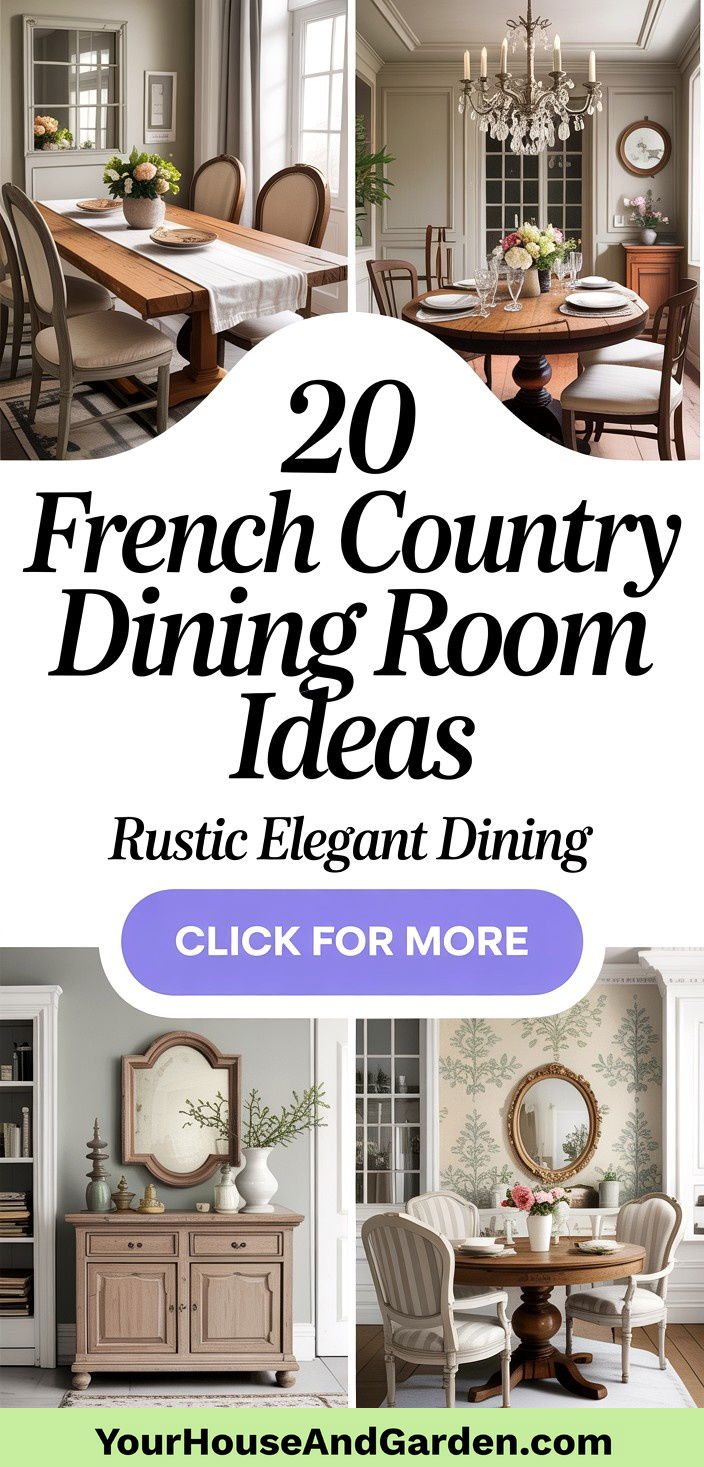
1. Reclaimed-Wood Farmhouse Table Anchors the Dining Room
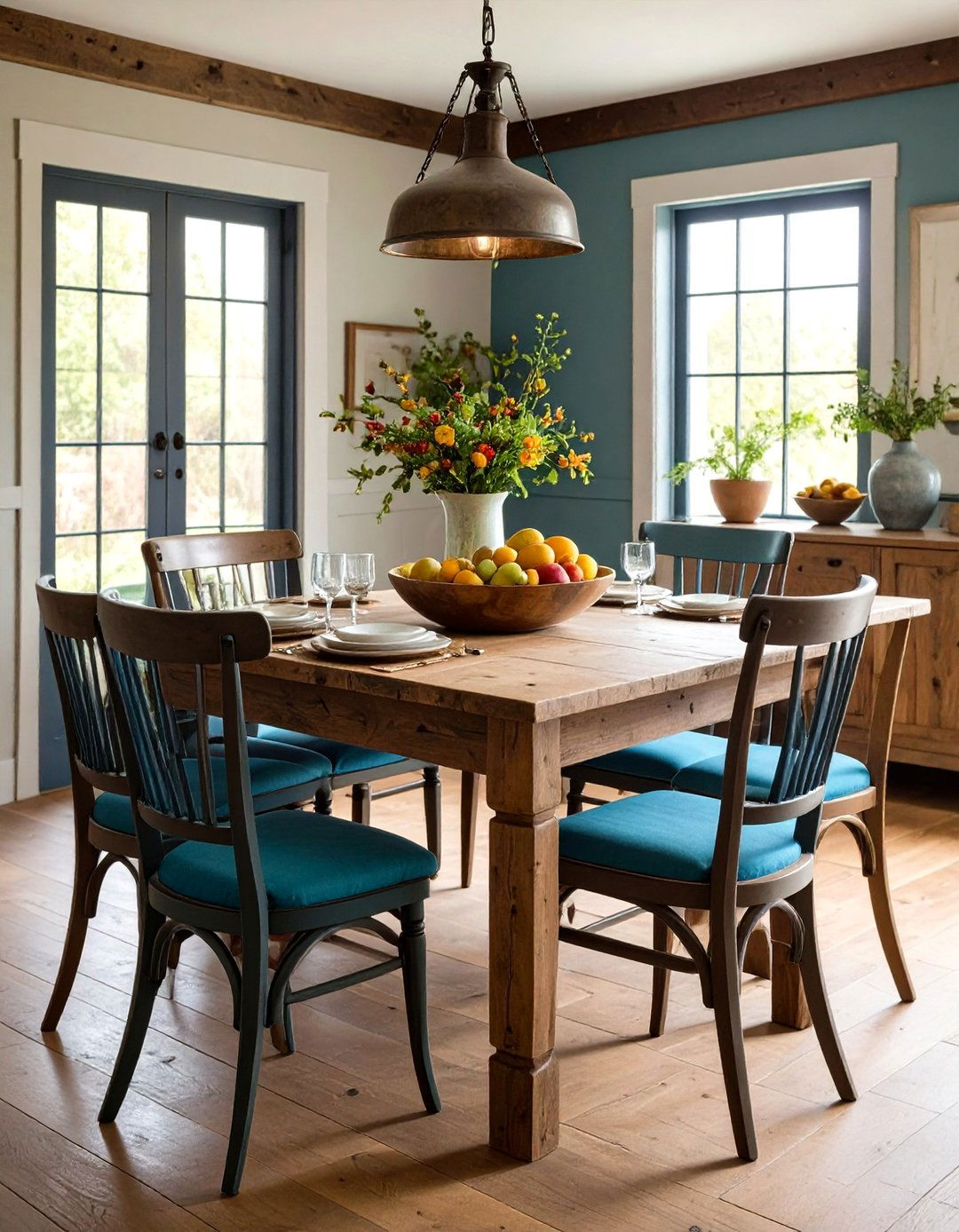
A well-proportioned, reclaimed-wood farmhouse table becomes the heart of a French Country dining room, instantly signaling relaxed hospitality. The grainy imperfections and bread-board ends tell a story older than any new piece could, while the generous scale invites lingering dinners. Add a beeswax finish to let the timber breathe, then pair with mixed chairs so the space feels evolved, not “purchased.” Slip a turned-leg bench down one side if you often host large families; the visual break keeps the arrangement airy. Finish with a simple linen runner and a bowl of seasonal fruit—both utilitarian and beautiful, in true Provençal spirit.
2. Weathered White Buffet Adds Storage and Soul
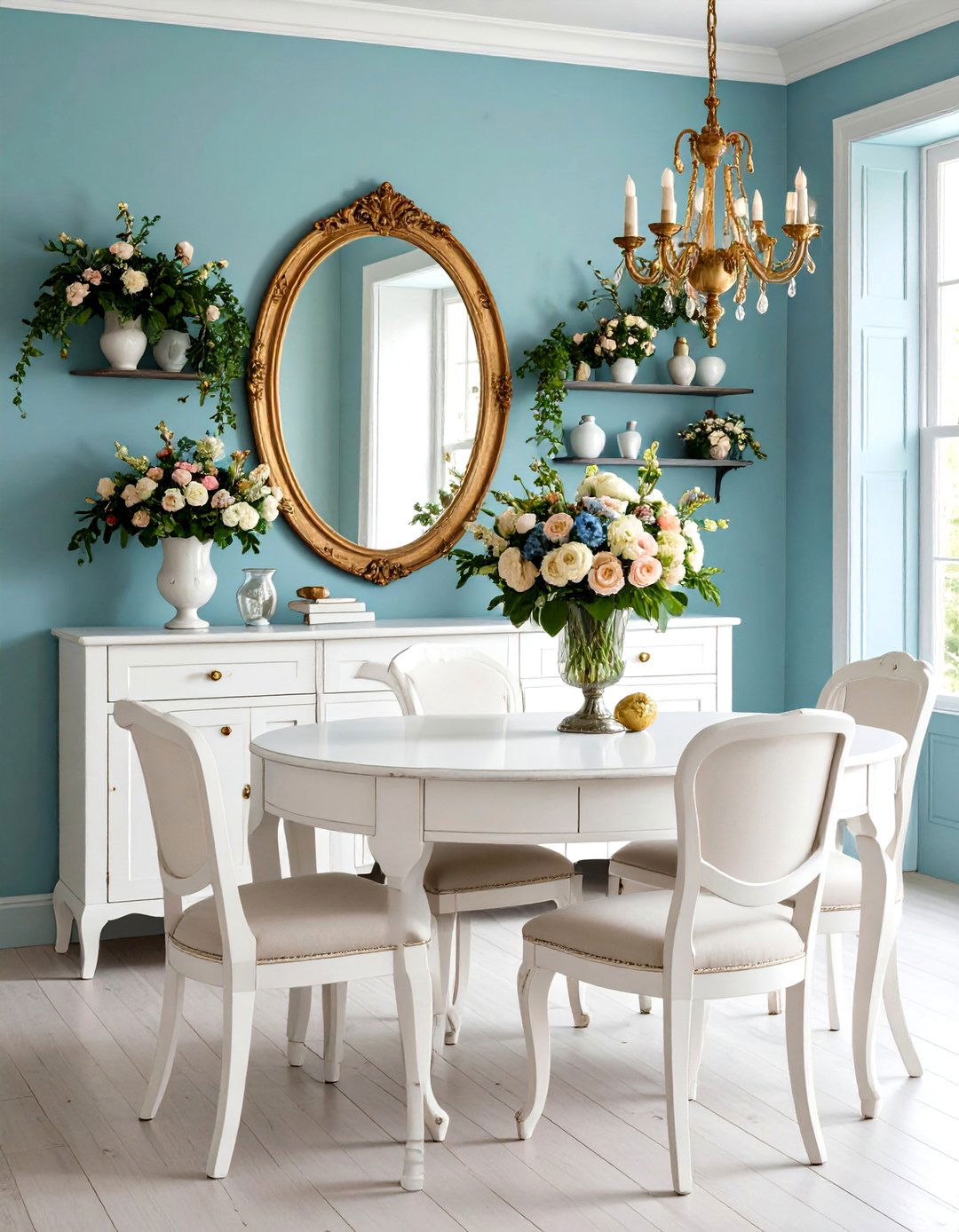
Consider a chalk-painted buffet with gently distressed edges to house china and linens while doubling as a serving station. The pale, rubbed finish bounces light around the room and lets hardware—aged-brass bin pulls or dainty key escutcheons—shine as quiet jewelry. Inside, line shelves with floral paper for a playful surprise, and in front, lean an oval gilt mirror to reflect candlelight at night. The piece’s ample drawers corral flatware, so tabletops stay serene, and its patina blends seamlessly with both inherited antiques and newer finds.
3. Linen Slipcovered Chairs Deliver Casual Elegance
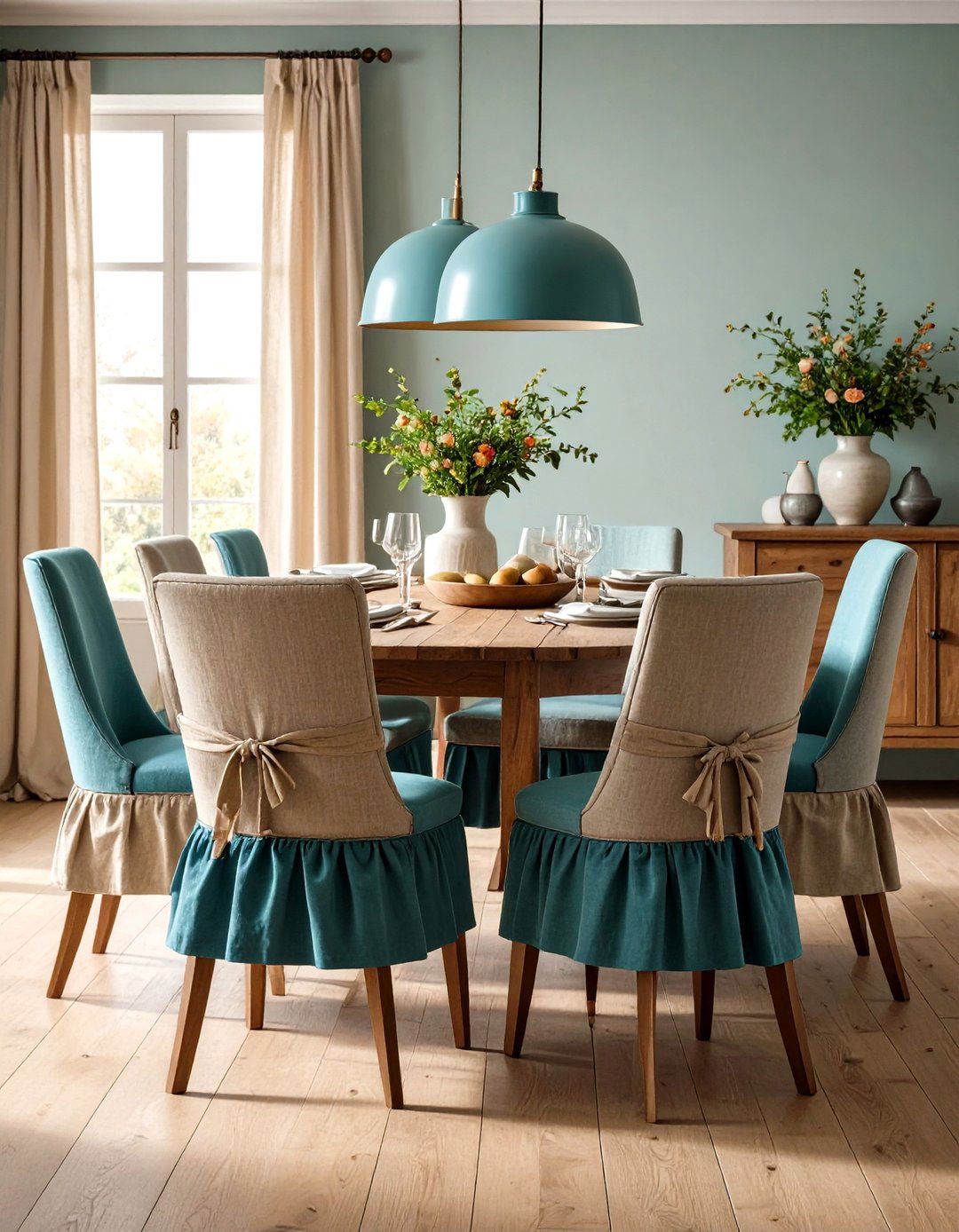
Unlike rigid, high-gloss seating, linen-slipcovered chairs whisper effortless comfort. Their skirted silhouettes soften hard table edges, while the washable fabric welcomes red-wine spills without anxiety. Choose creamy flax or dove gray for a base neutral, then swap ribbon ties seasonally—sage in spring, charcoal come autumn. If your dining set is a mix-and-match collection, identical slips visually unite it. Keep the look unpressed; a few natural wrinkles feel authentic, echoing French country’s preference for lived-in charm over perfection.
4. Wrought-Iron Chandelier Sets Rustic Romance
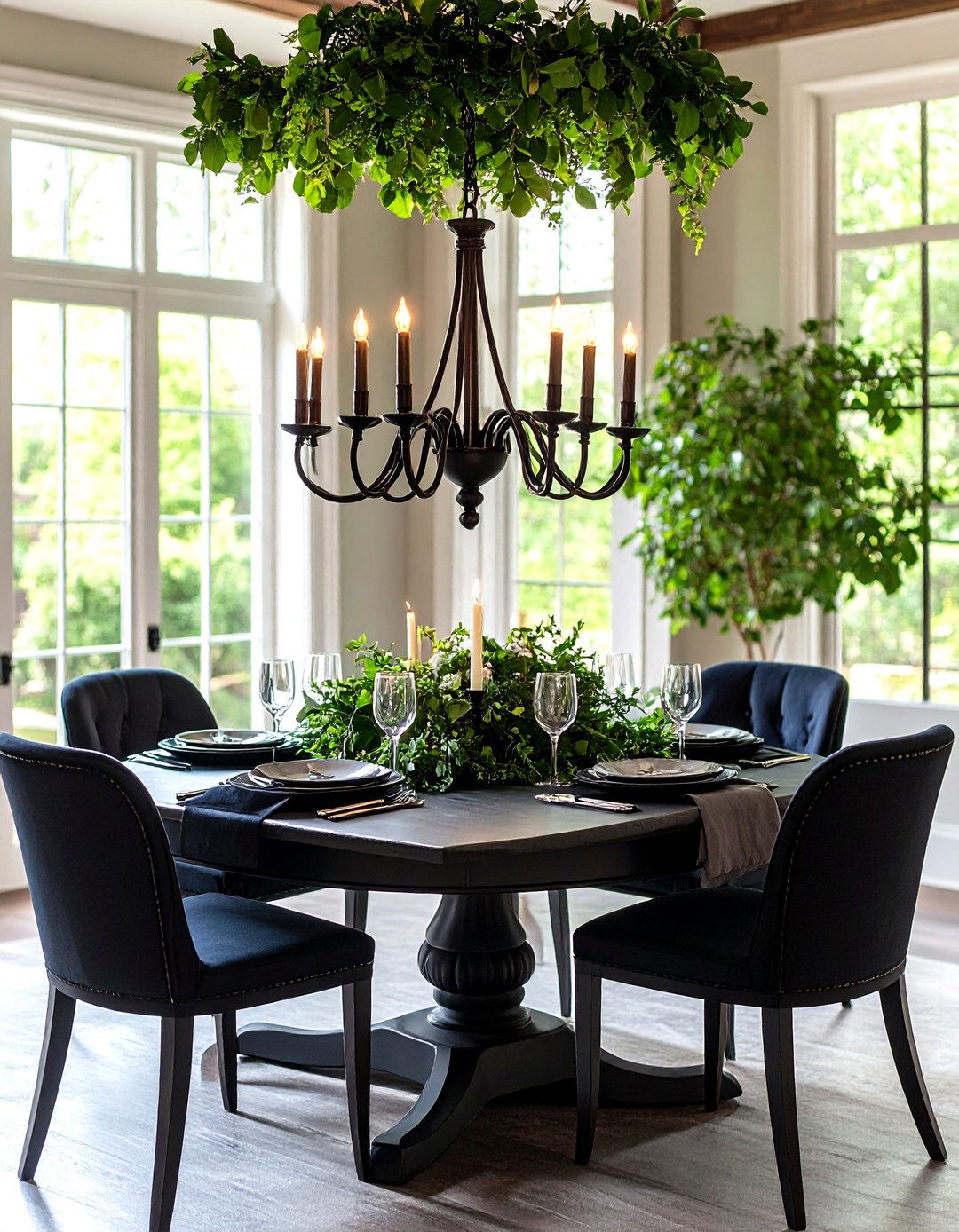
Dangling over the table, a scroll-armed wrought-iron chandelier marries farmhouse sturdiness with chateau grace. Opt for hand-rubbed finishes—matte black, antique bronze, or white-washed iron—and faux candle sleeves that glow like beeswax tapers. Adjustable chains let you position the fixture 30–34 inches above tabletop height, perfect for conversation and sightlines. Thread a few greenery sprigs through the arms during holidays, or hang petite linen shades for a softer silhouette the rest of the year.
5. Toile Curtains & Cushions Bring Classic Pattern
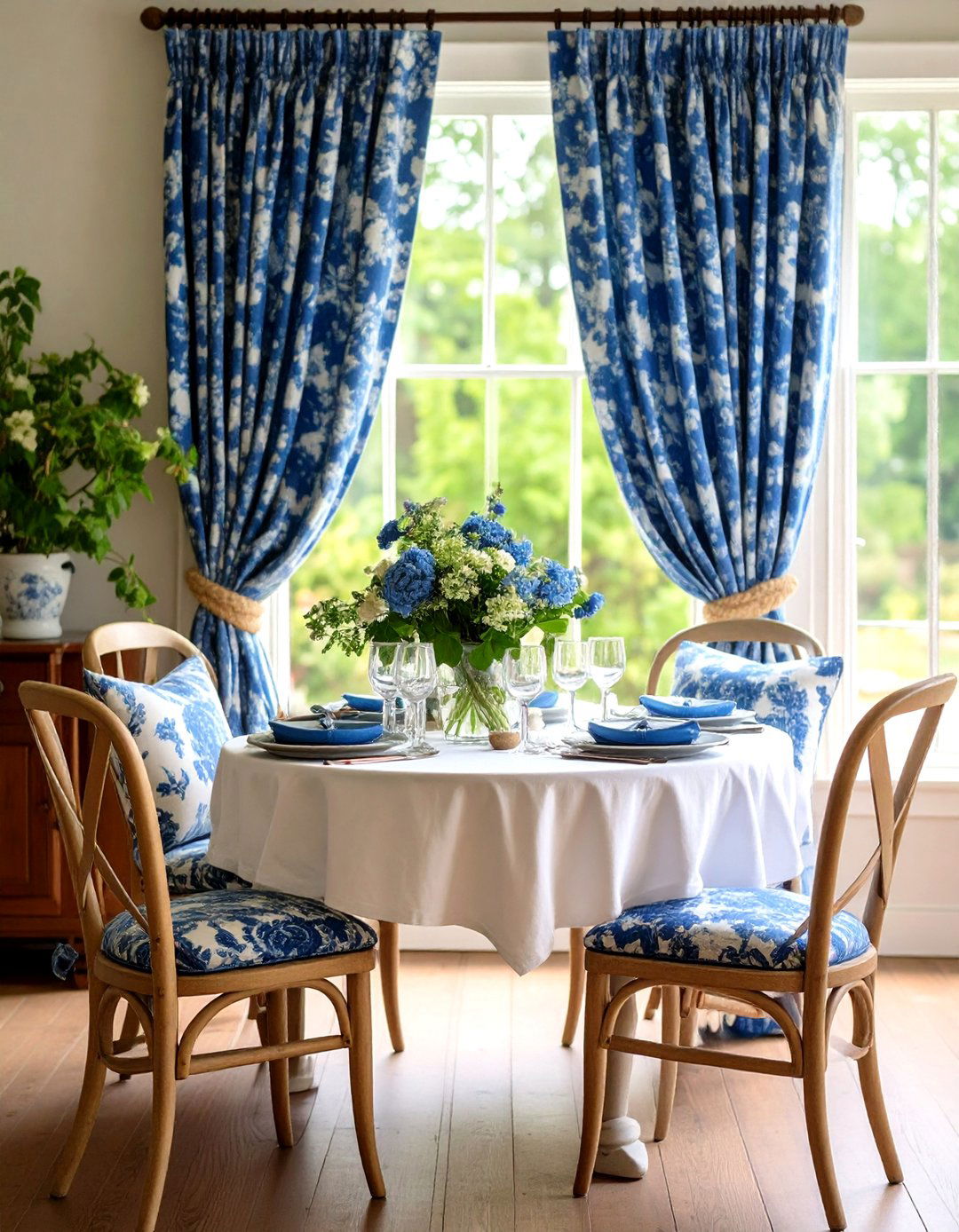
Few prints say “French country” like pastoral toile. Frame windows with full-length toile panels in faded indigo or cranberry red to draw the eye upward and diffuse glare. Repeat the motif subtly on chair cushions or a slim bench pad, leaving solids on larger upholstered pieces so the room doesn’t feel busy. Tie curtains back with jute rope for textural contrast, and let the print’s storytelling scenes spark dinner conversation.
6. Limestone or Terracotta Floors Ground the Palette
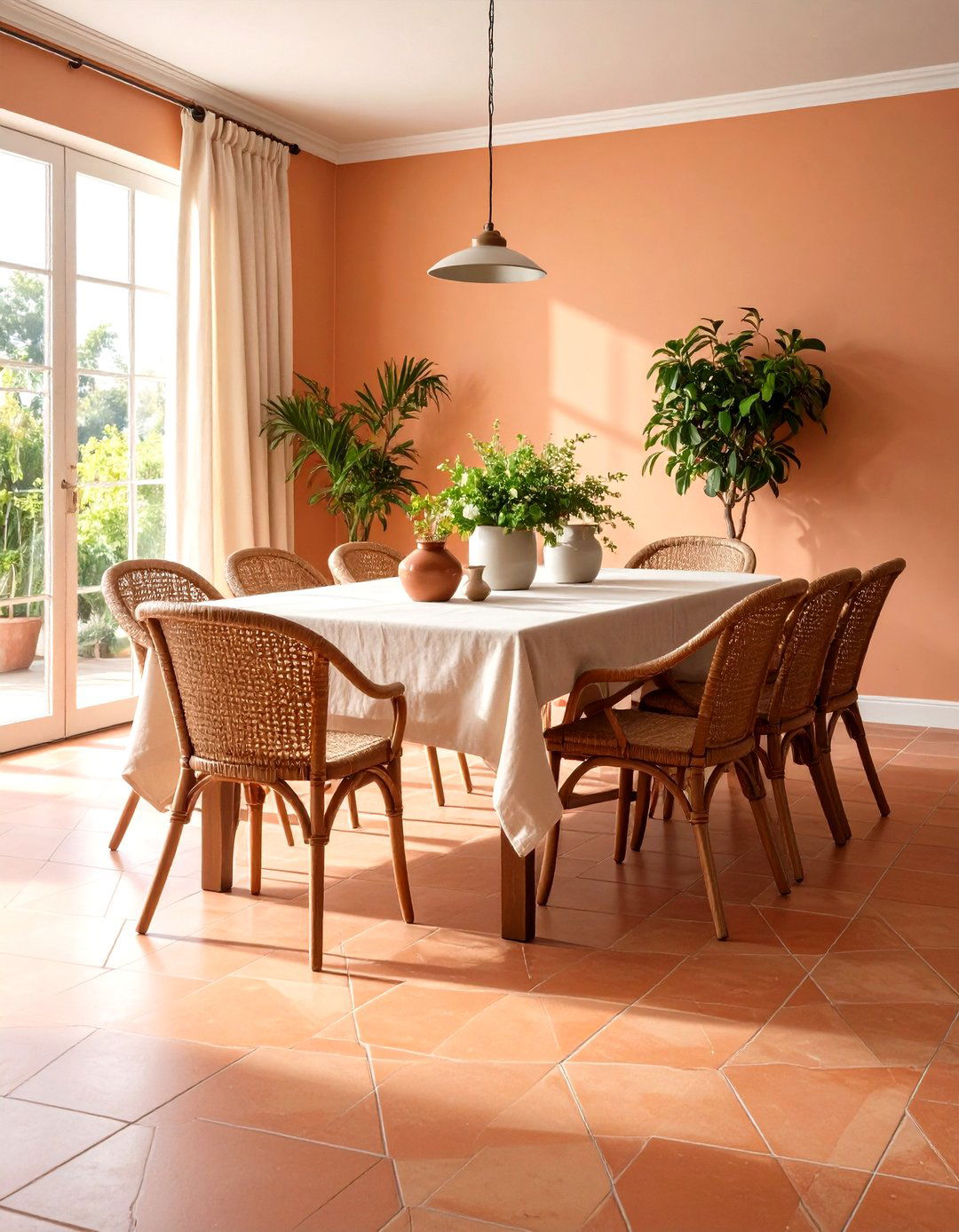
Underfoot, limestone tiles or terracotta squares lend an earthy authenticity straight from Provence farmhouses. Their muted beige, sand, or salmon tones complement warm woods and prevent the space from skewing too formal. If replacing flooring isn’t feasible, layer a seagrass or jute rug that mimics the natural texture while adding softness. Seal porous stone with penetrating sealer to resist spills without adding unwanted shine, preserving the matte, chalky finish that feels centuries old.
7. Antique Hutch Displays Everyday Crockery
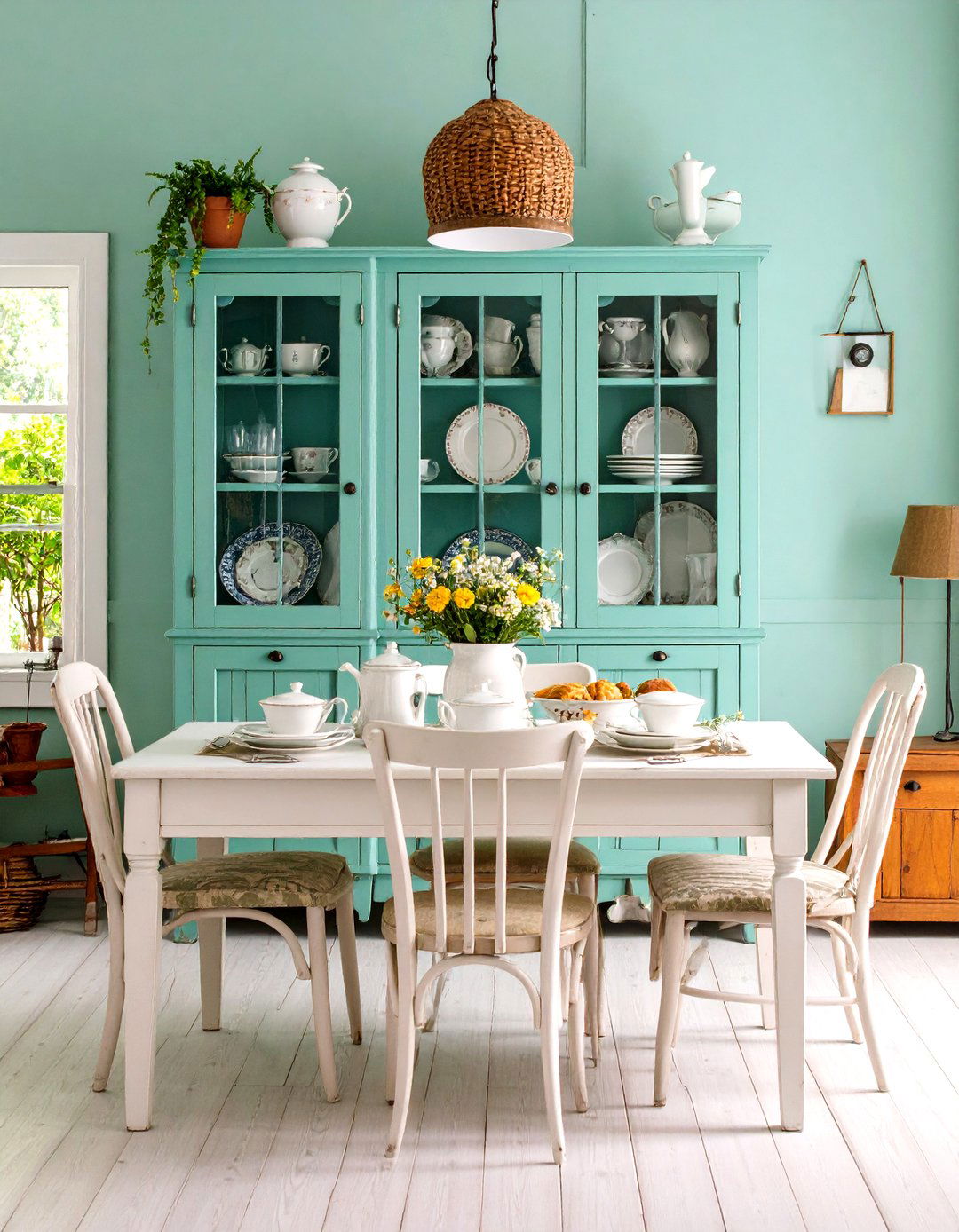
An antique hutch—sometimes called an enfilade—turns storage into art. Stack white ironstone pitchers, glass cloches, and mismatched vintage plates behind chicken-wire doors for curated casualness. The open shelves let diners grab extra dishes without rummaging through cabinets, making guests feel at home. If your thrift-store find is dark, sand the top and lime-wash the base; the two-tone effect adds depth and respects the piece’s timeworn history.
8. Soft Pastel Walls Inspired by Provence Sunlight
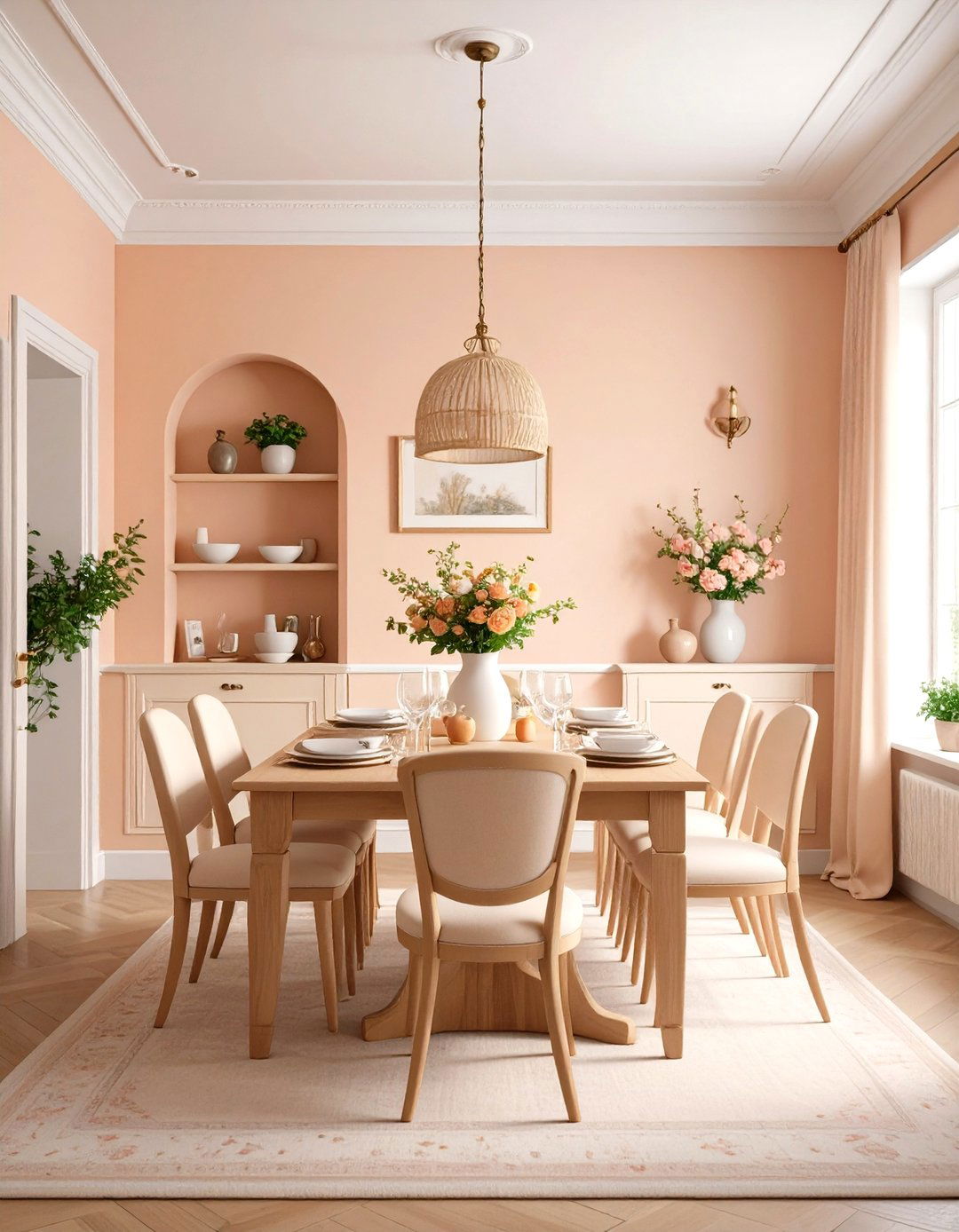
Soft hues—think dusty lavender, misty sage, or pale duck-egg—bathe the dining room in tranquility without veering childish. These chalky tones echo fields of wild herbs and sun-bleached shutters, creating a backdrop that flatters skin tones and food presentation alike. Keep trimwork warm white to frame the color, and extend the shade onto built-in shelving for seamless continuity. In low-light spaces, pick a pastel with a touch of gray to avoid saccharine sweetness.
9. Exposed Beams and Shiplap Ceiling Add Texture
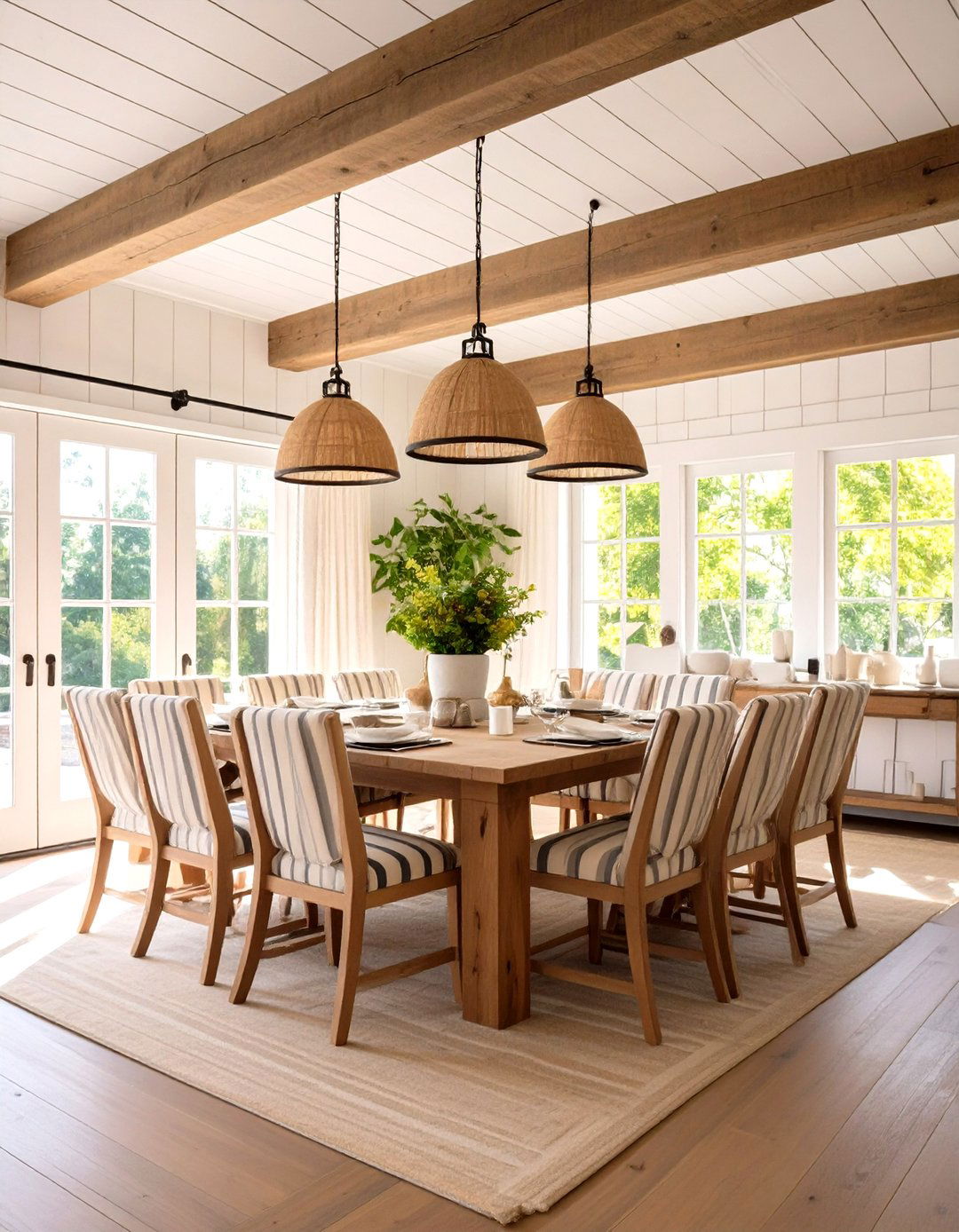
If your architecture allows, reveal structural beams or install faux reclaimed timber to draw eyes upward and add rustic heft. Between beams, paint shiplap boards in soft white to keep the ceiling from feeling heavy. The textural interplay channels centuries-old farmhouses while masking modern wiring or recessed lights. Highlight wood grain with a light wax, and play off the lines with vertically striped chair pads for rhythm.
10. Herb Bouquets & Botanical Prints Energize the Table
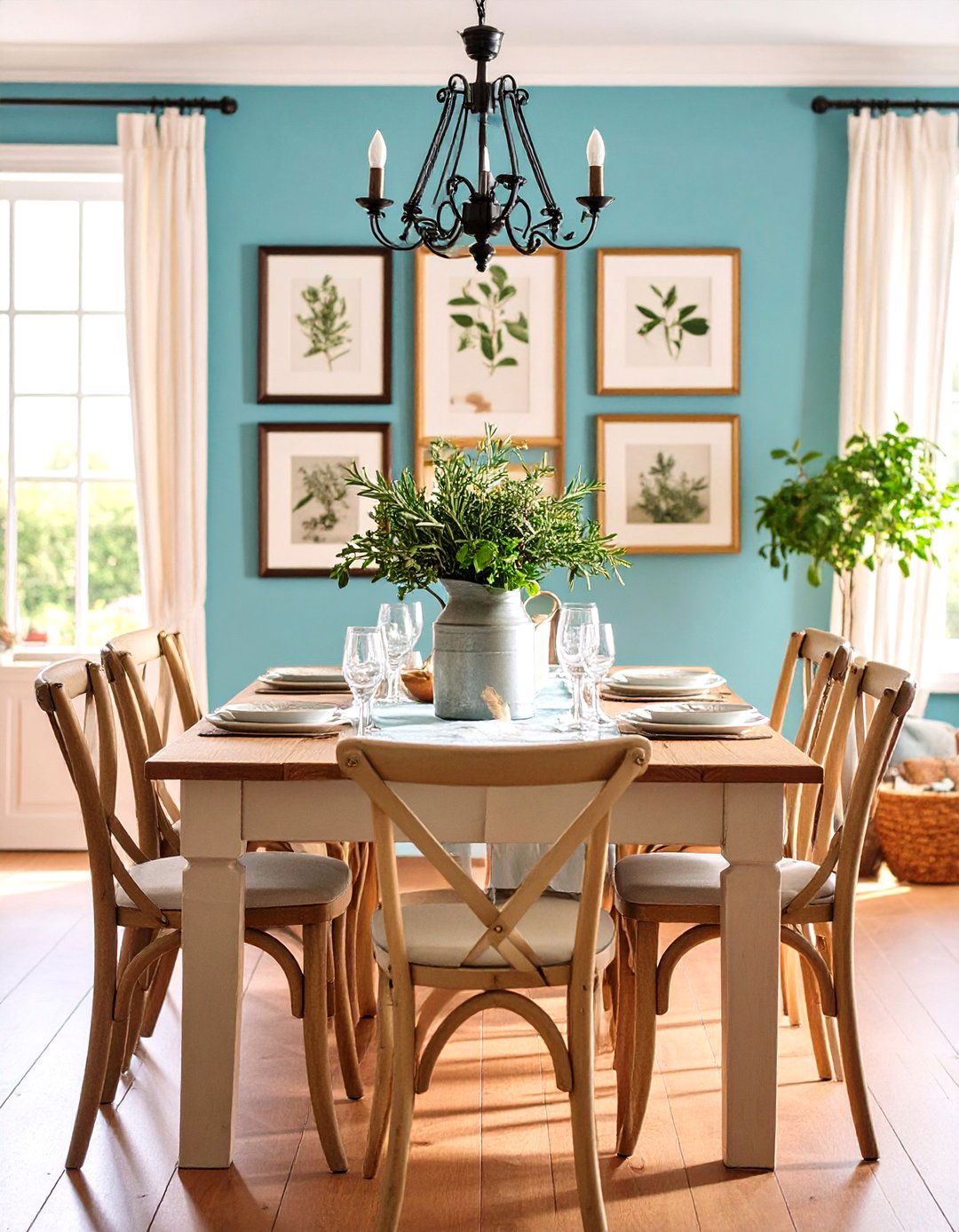
A simple galvanized jug filled with fresh rosemary, thyme, and olive sprigs becomes an aromatic, budget-friendly centerpiece. Hang vintage botanical lithographs in slim black frames along the walls to echo the greenery and provide year-round color. Rotate stems as seasons shift—lavender in June, wheat in September—to keep the ritual fresh. The living centerpiece underlines French country’s celebration of everyday nature over ostentatious floral arrangements.
11. Mixed Metals—Aged Brass and Pewter—Create Depth
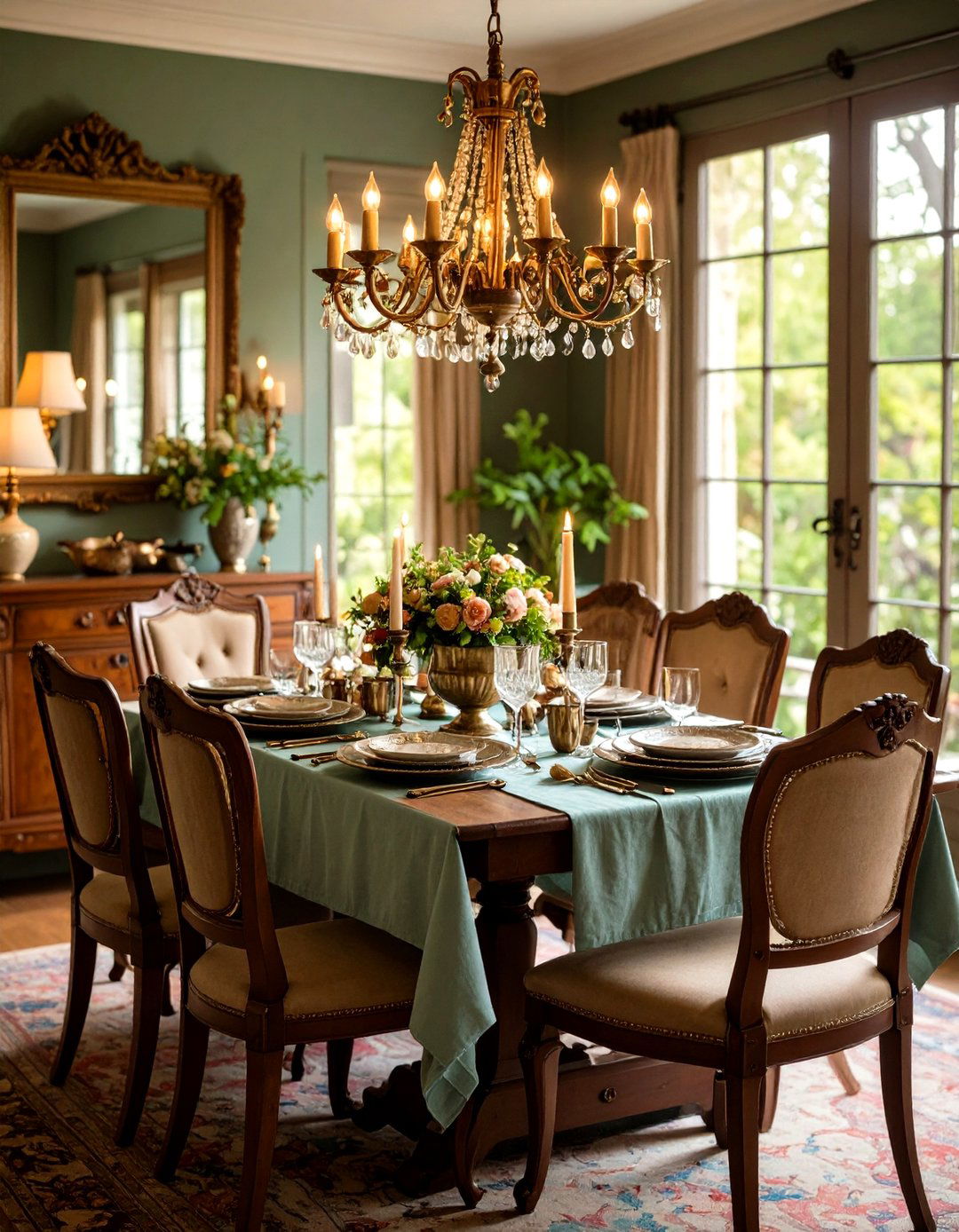
French Country dining rooms rarely stick to one metal finish; the charm lies in collected layers. Combine aged brass picture lights with pewter chargers and wrought-iron hardware for a curated, heirloom feel. Unlacquered brass develops a mellow patina over time, while pewter’s satiny gray softens high-contrast palettes. Keep the mix intentional: repeat each finish at least twice so the eye reads it as a pattern, not a mishap.
12. Bistro Chairs Offer a Café-Casual Twist
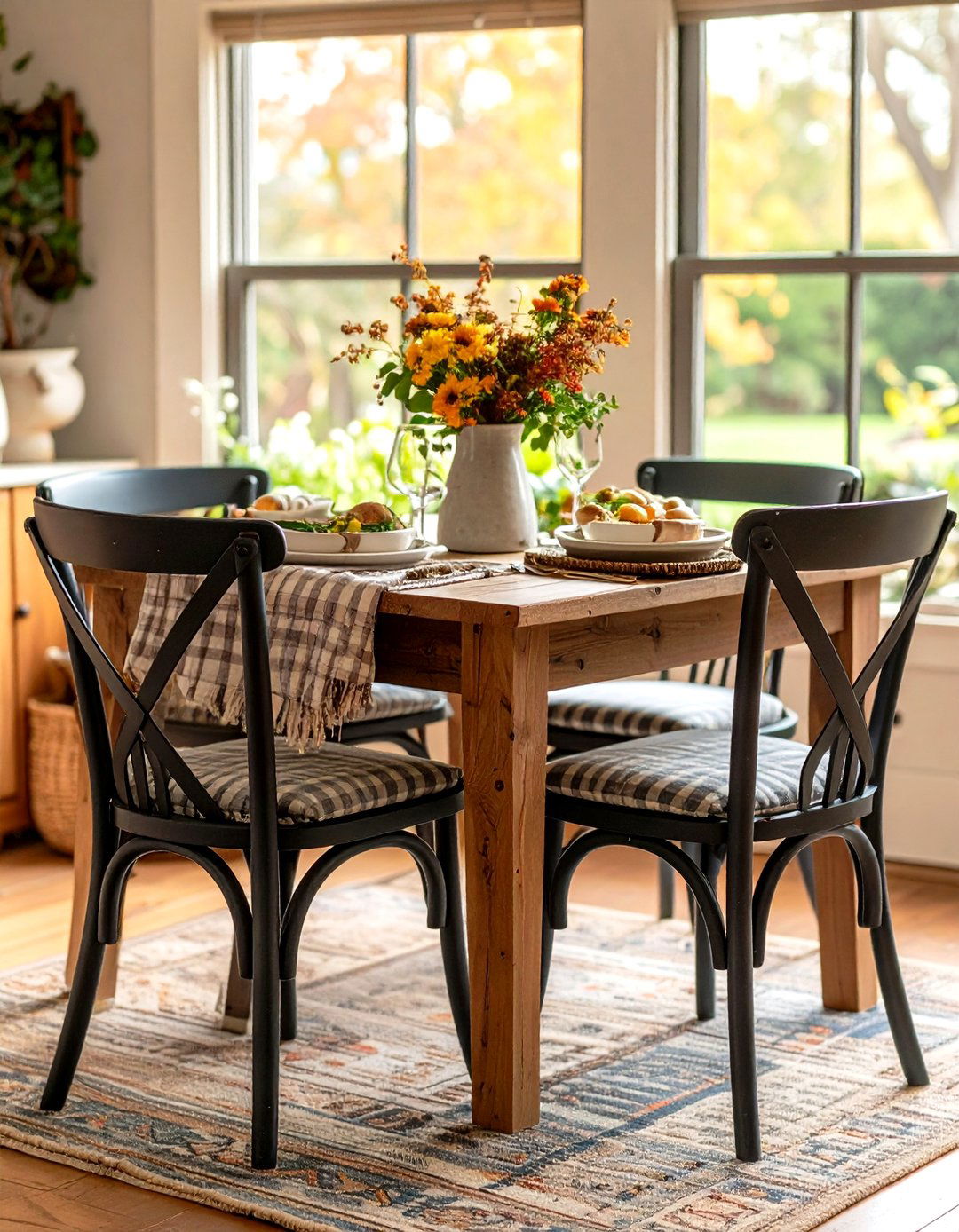
Swap two heads-of-table chairs for classic rattan-back bistro seats to nod to Parisian cafés without abandoning rustic roots. Their curvy silhouettes break up the boxy lines of farmhouse tables, and the lightweight frames slide under quickly for cleaning. Paint the wooden frames charcoal for subtle contrast or leave natural if you favor warmth. Combine with linen seat pads in ticking stripes to marry country ease and urban flair.
13. Stone Fireplace or Mantel Adds Gravitas
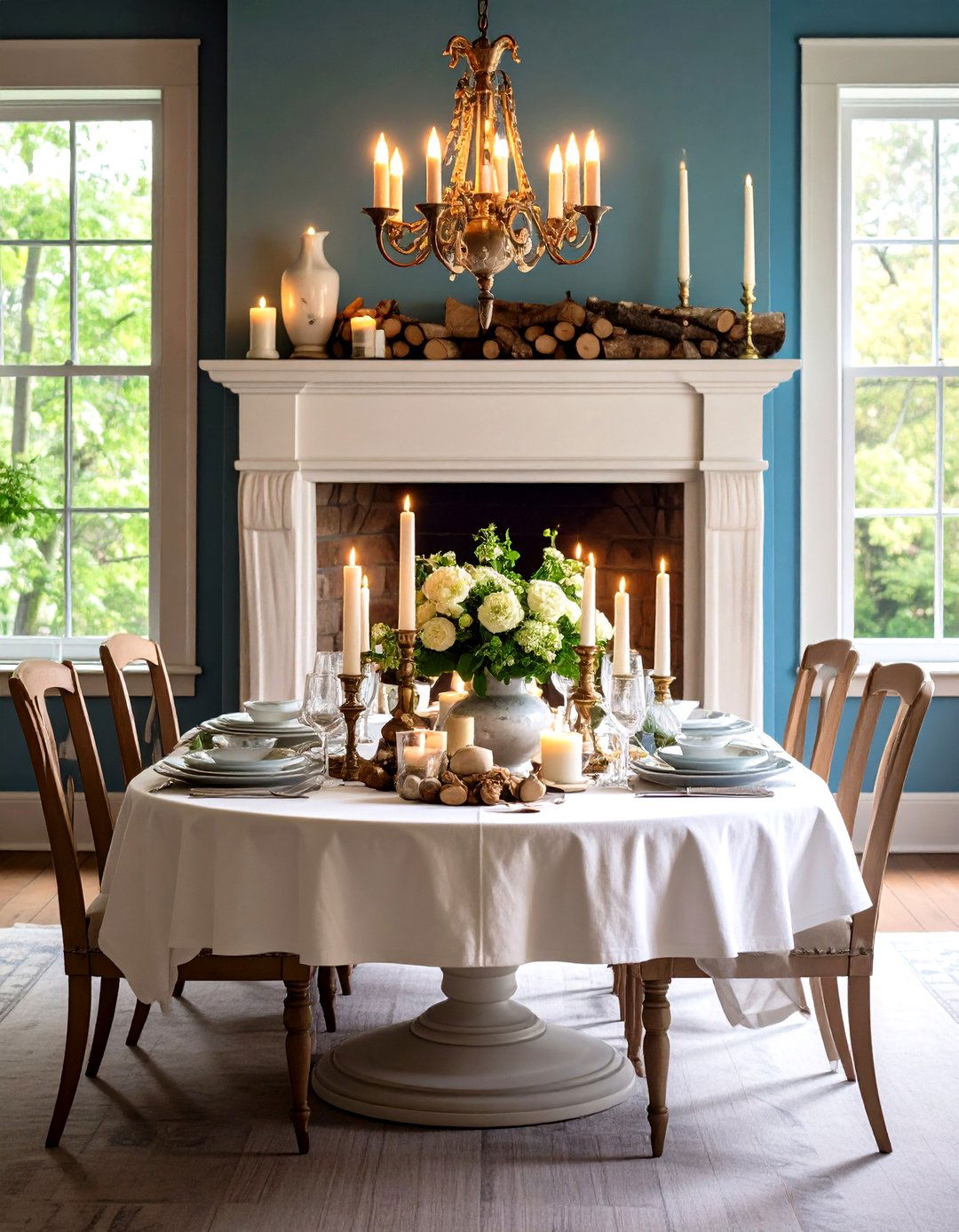
Even a shallow stone mantel—whether limestone, fieldstone, or cast concrete—grounds a dining room, offering a natural perch for candles and ironstone pitchers. Flank it with tall tapered sconces to amplify evening glow. If a working hearth isn’t possible, fill the firebox with stacked birch logs or pillar candles to suggest warmth without renovation headaches. The rugged surface balances delicate china and crystal, giving the room layered authenticity.
14. Linen Tablecloth & Grain-Sack Runner Layer Textiles
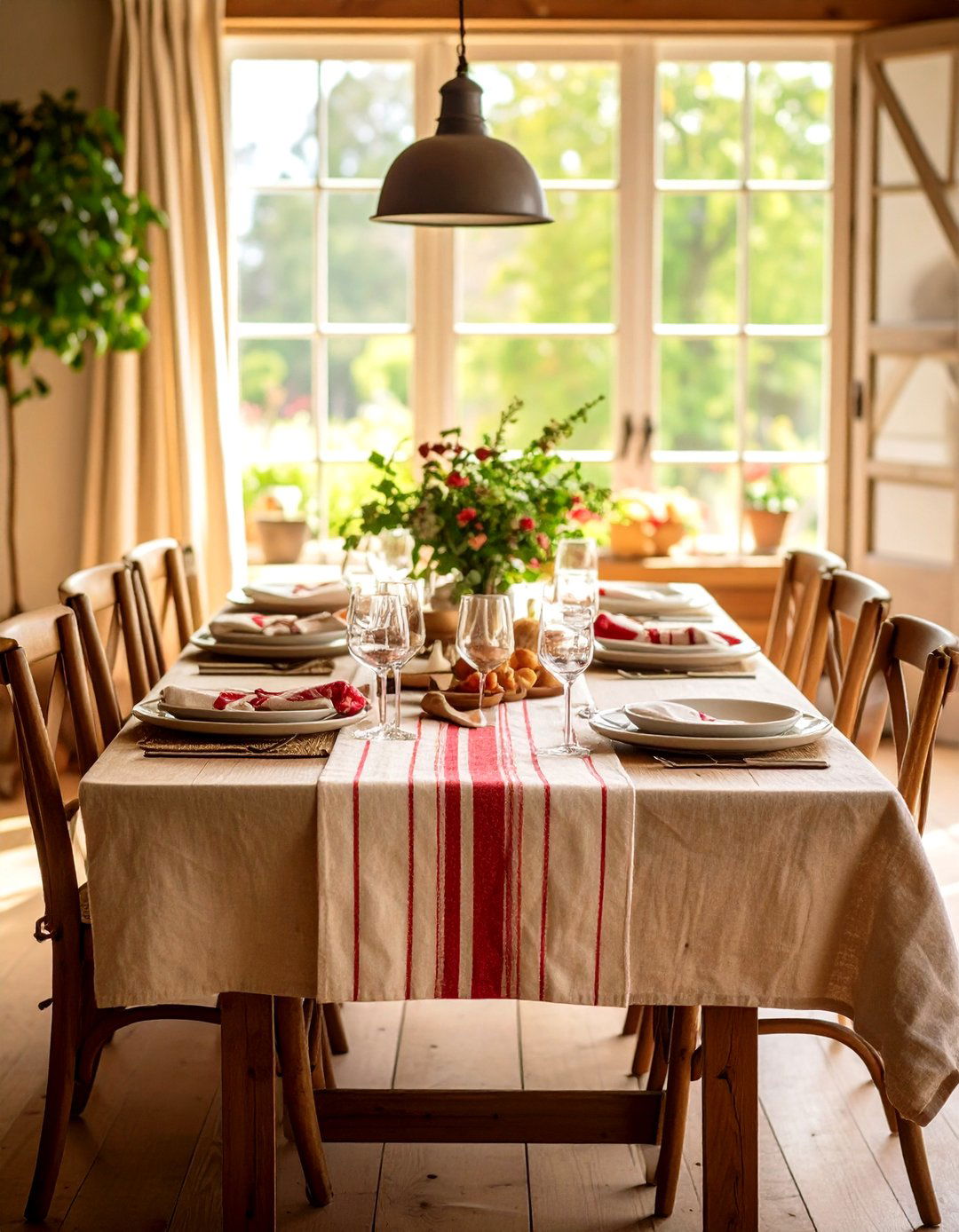
Dress the tabletop with washed-linen cloths in oat or dove tones, then add a vintage grain-sack runner for quiet pattern. The runner’s red or blue stripes echo farmhouse heritage while protecting high-traffic zones. Keep napkins crisp white so flatware stands out, and knot them casually instead of formal folds. Launder linens in hot water for softness; the slight crinkle embodies the relaxed spirit of country dining.
15. Vintage Wall Sconces & Candlelight Soften Evenings
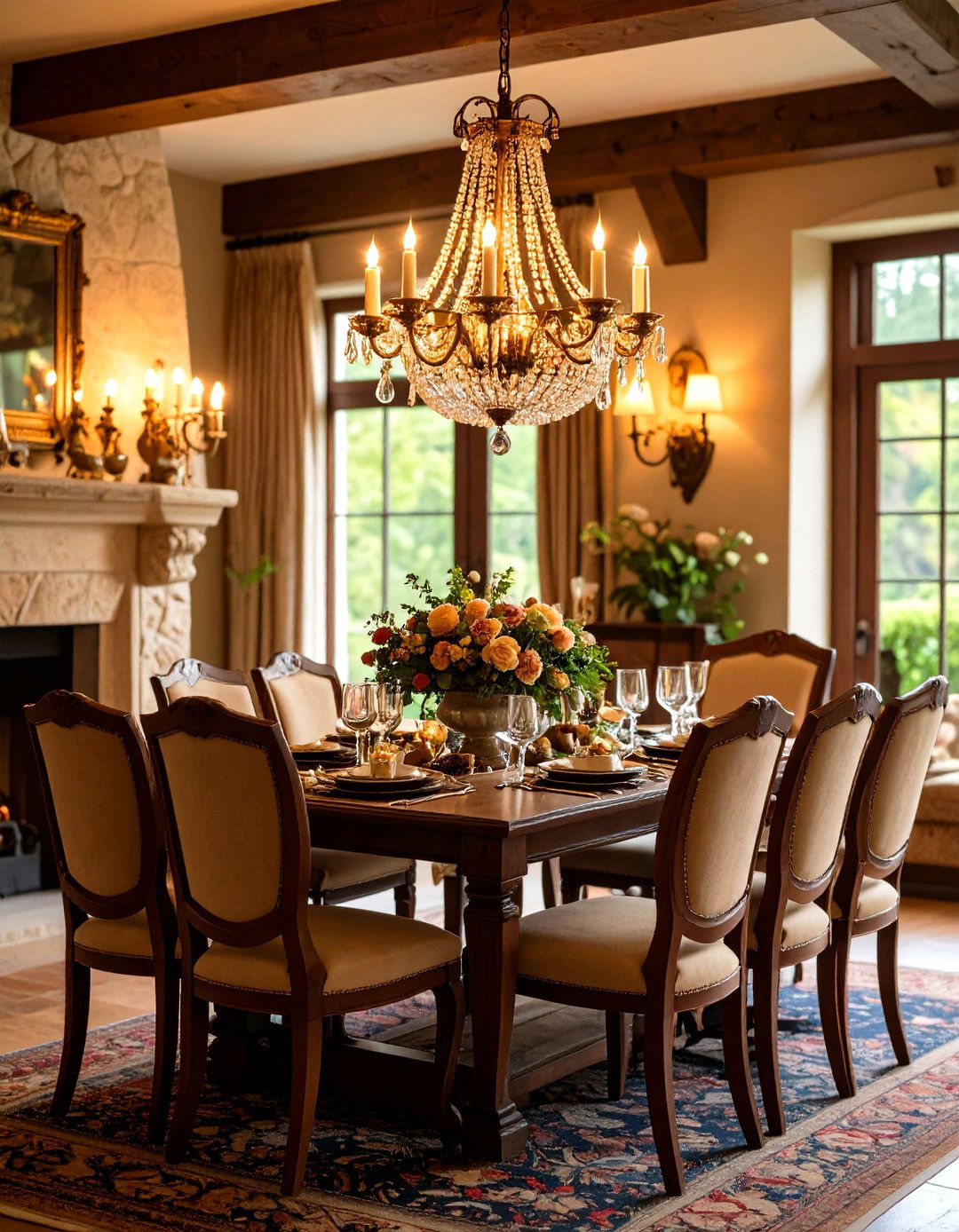
Install a pair of ornate, second-hand wall sconces at eye level to supplement overhead lighting and create intimacy. Choose pieces with fluted crystal drops or scrolled arms; rewiring them to LED bulbs keeps energy use modern while preserving charm. On special nights, swap bulbs for wax tapers and let flickering light play across stone walls and glassware, transforming ordinary dinners into ambience-rich feasts.
16. Weathered Mirror Amplifies Light and Space
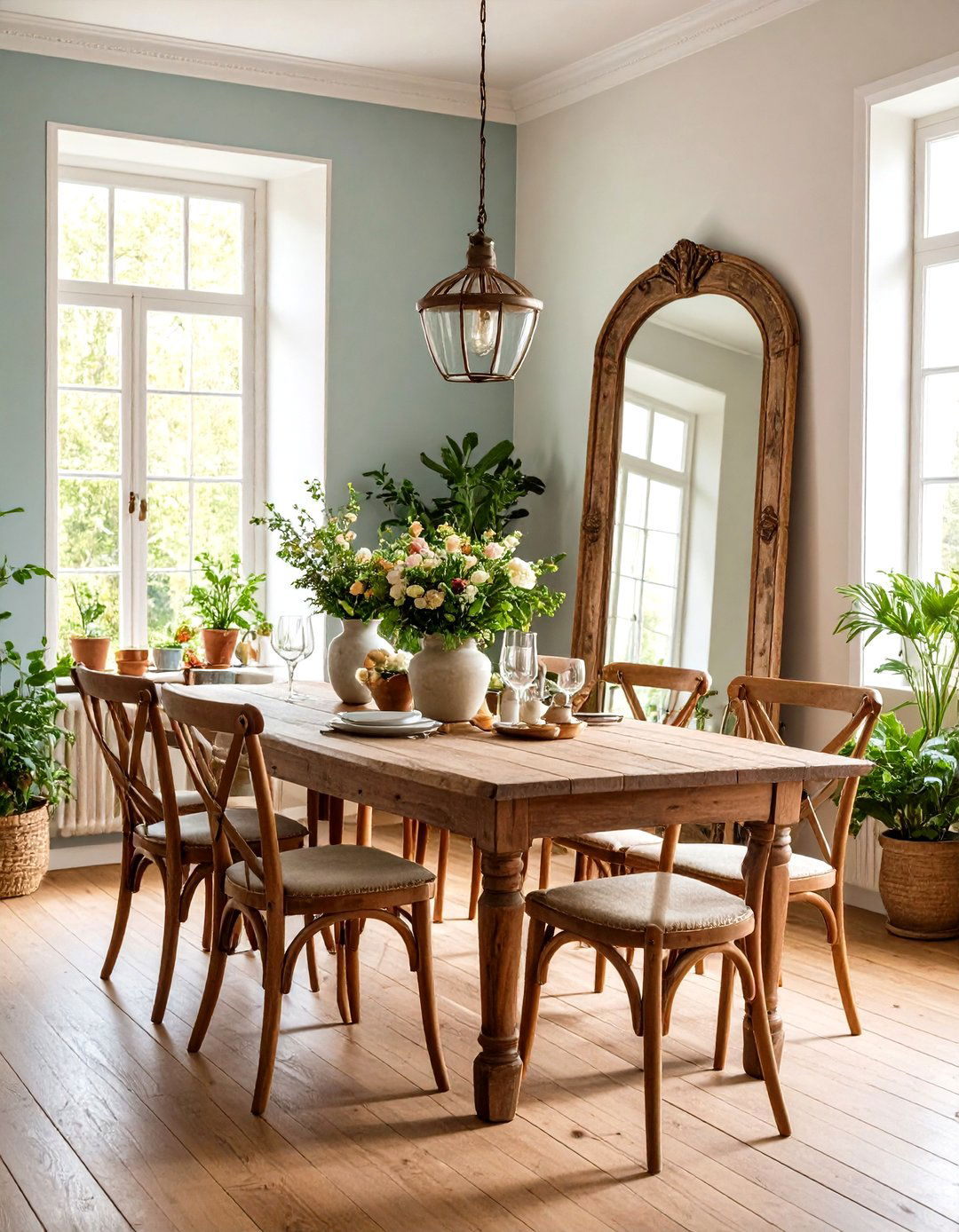
A tall, time-worn mirror—foxed glass and chipped frame welcome—bounces natural light around the dining room and visually doubles candlelit tablescapes. Position it opposite a window or French doors to pull the garden view inside. Leaning rather than hanging the mirror keeps the mood casual, and its reflective surface makes narrower rooms feel generously wide without construction dust.
17. Open Shelving Keeps Everyday Dinnerware Handy
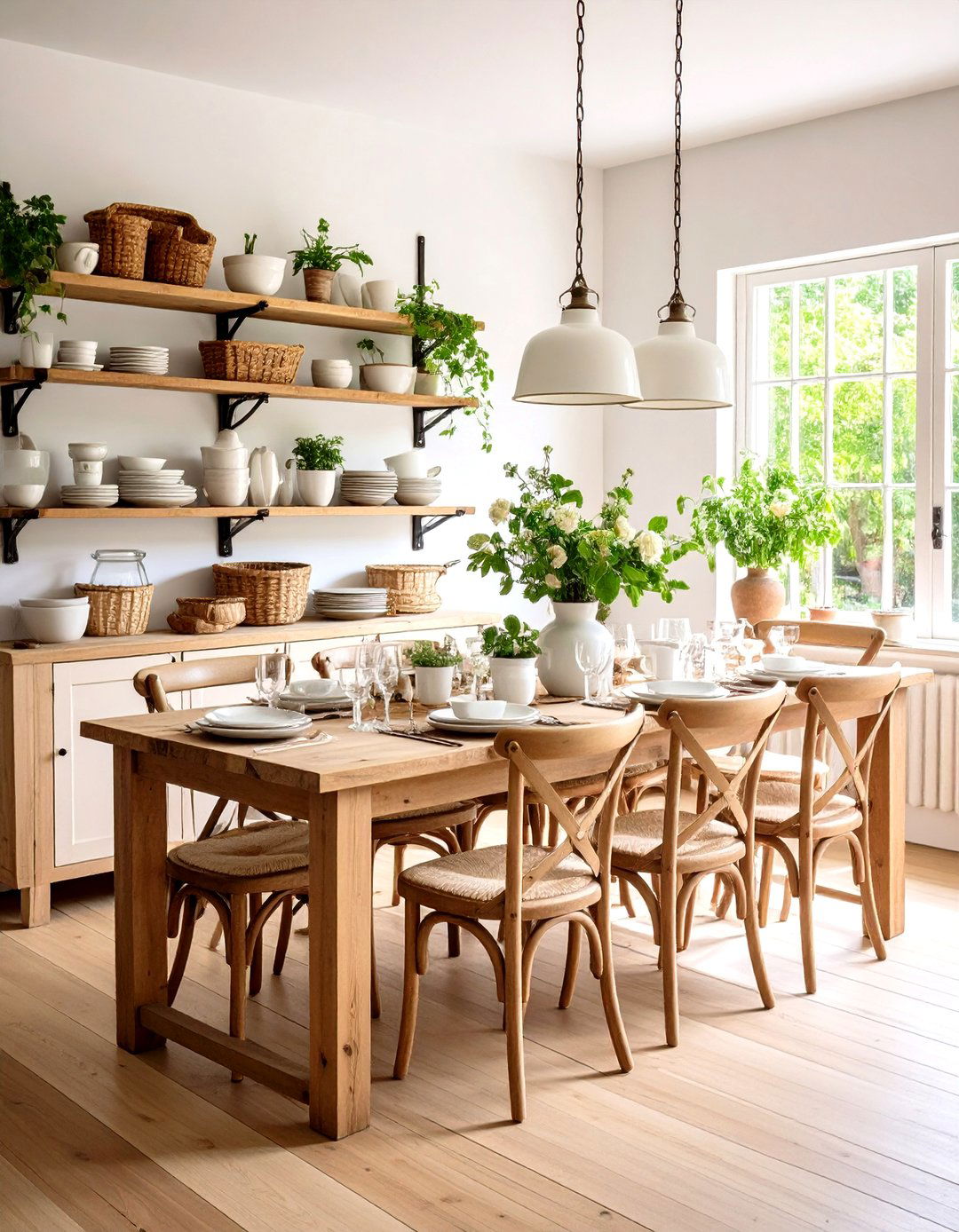
Rustic floating shelves, fashioned from reclaimed planks and simple iron brackets, let you store frequently used plates and glassware within arm’s reach. Stack dishes by tone—creamy whites, soft grays—for a cohesive vignette, and tuck baskets of napkins on top for texture. Because contents stay visible, the setup encourages editing: only items you truly love earn shelf space, preventing clutter while showcasing personality.
18. Colorful Ceramic Serveware Adds Garden Cheer
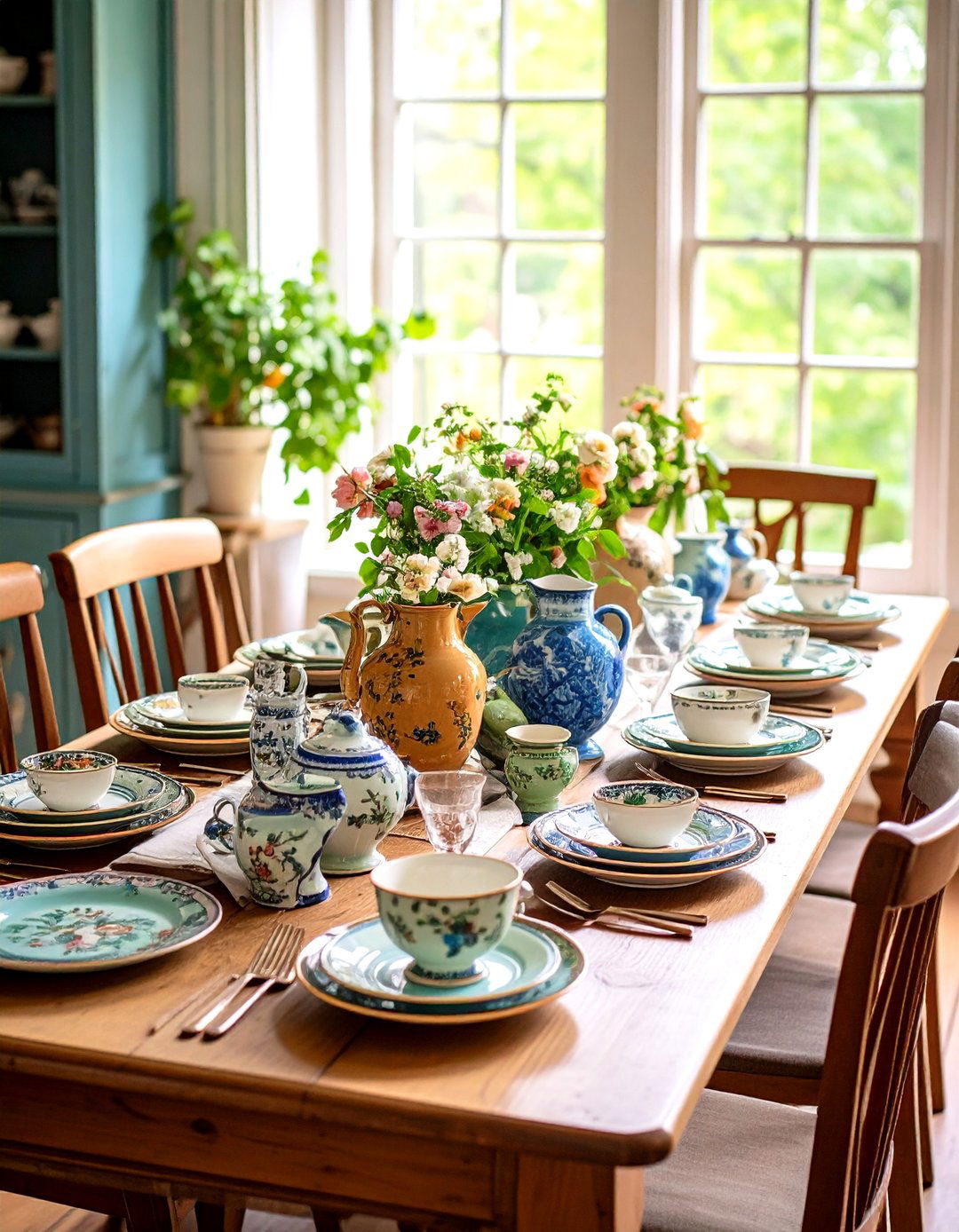
Introduce soft pops of terracotta, sage, and cornflower through hand-painted pitchers, salad plates, or tureens reminiscent of regional French pottery. The muted yet cheerful glazes keep the otherwise neutral palette lively and reflect the abundance of Provençal markets. Rotate pieces onto the table or hutch as menus change—sunflower-yellow bowls for summer ratatouille, olive-green platters for autumn roasts—for functional décor that never feels static.
19. Lavender & Olive Topiaries Infuse Scent and Color
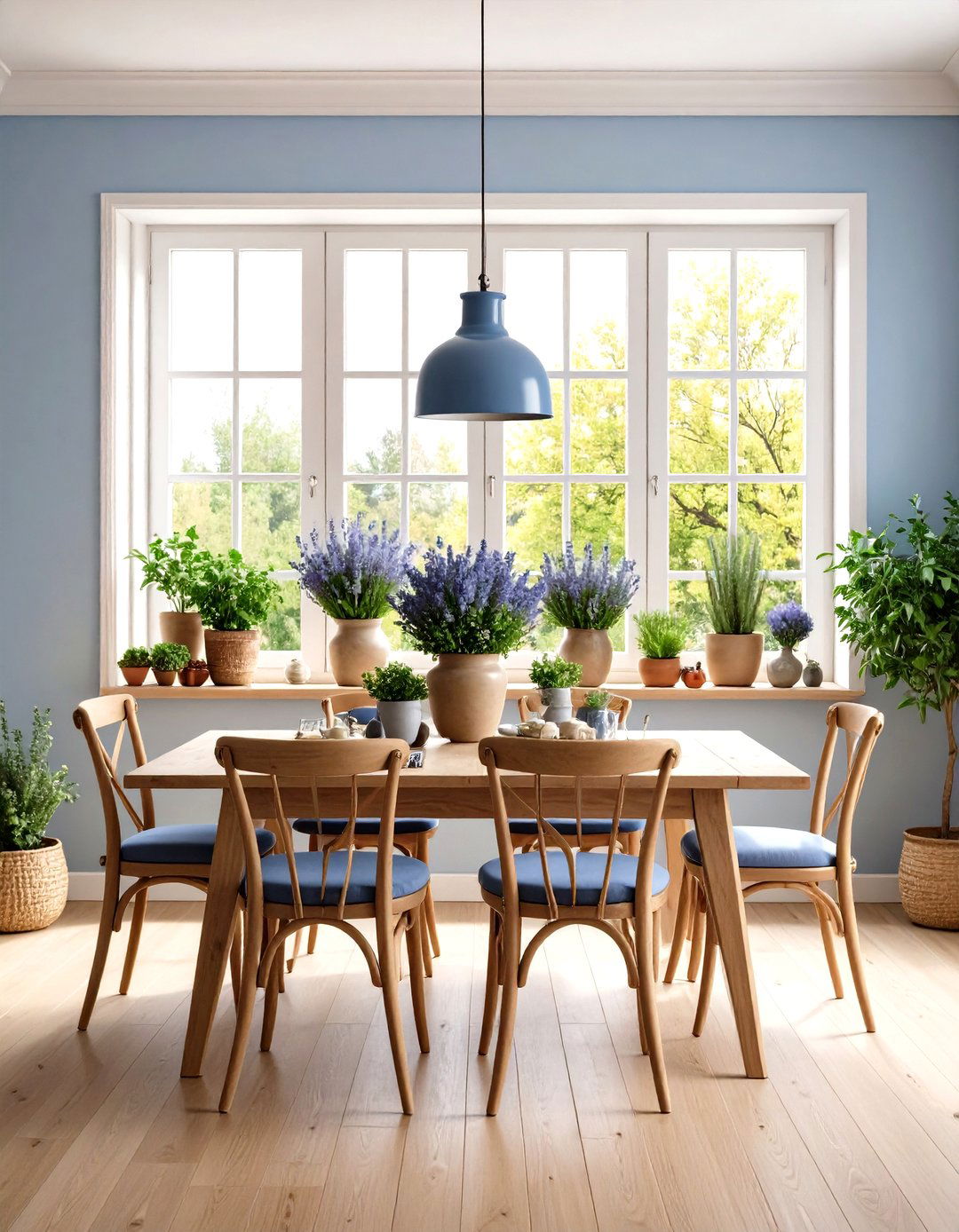
Cluster potted lavender or petite olive trees along the windowsill or buffet to perfume the room and echo Mediterranean landscapes. Their soft silvery foliage harmonizes with pewter accents and pastel walls, while the aromatic oils subtly deodorize the space after hearty meals. During colder months, dry bunches of lavender and tie them with twine around linen napkins for a seasonal, sensory touch that costs pennies.
20. Provincial Bench or Banquette Encourages Long Meals
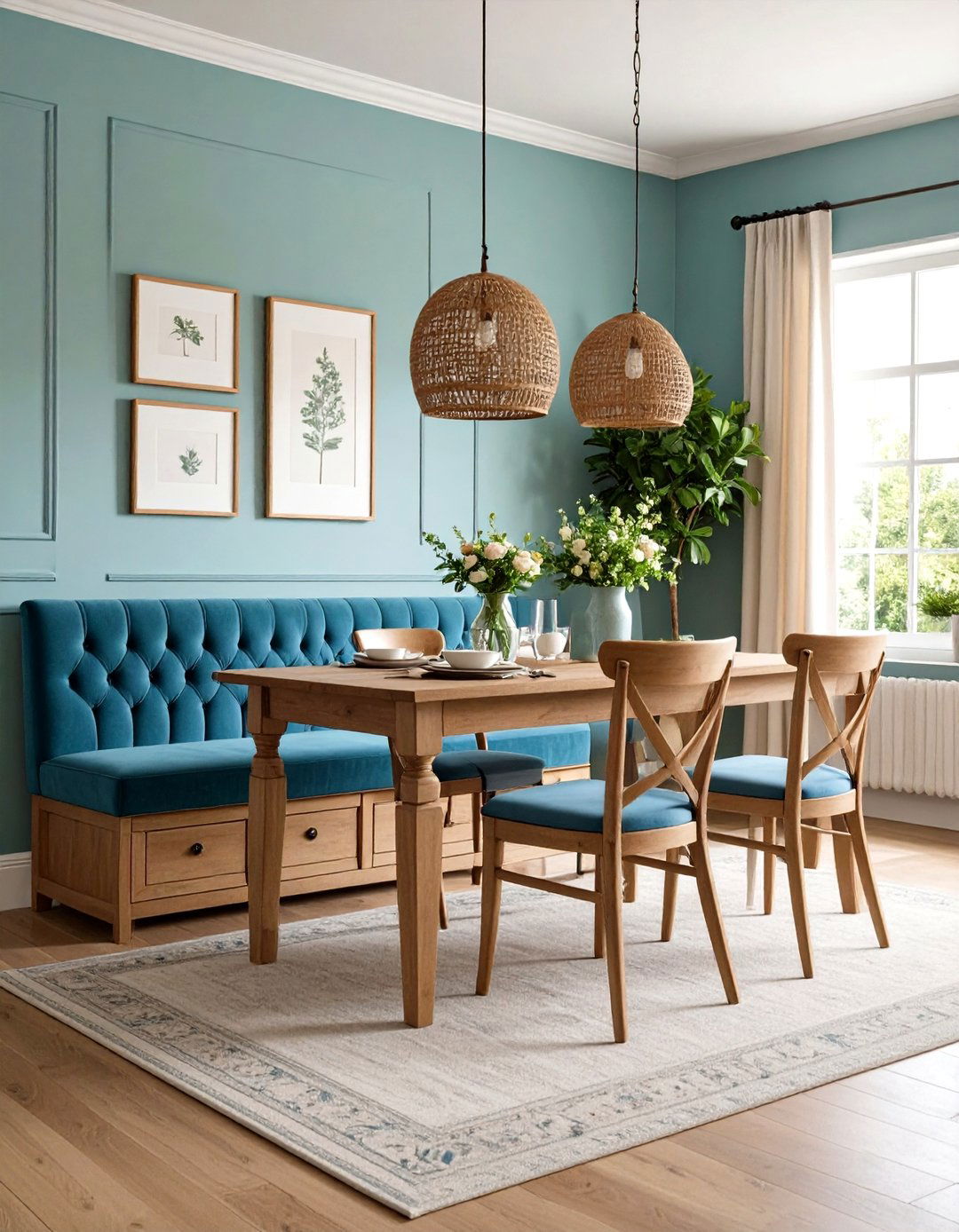
A tufted linen-covered banquette or simple plank bench down one side of the table encourages guests to squeeze in and linger—mirroring convivial French country suppers. Slip hidden drawers beneath for tablecloth storage, or add a narrow shelf above the seat back to perch artwork. The relaxed seating mix underscores the style’s “collected over time” ethos and frees floor space, making small dining rooms feel airy and adaptable.
Conclusion:
Layering French Country dining room details is less about strict rules and more about storytelling: reclaimed woods whisper of past harvests, limestone floors mirror Provençal terraces, and lavender sprigs bring garden freshness indoors. Blend rustic textures with refined silhouettes, keep the palette soft and natural, and favor pieces that show honest wear. Together, these elements create a space where everyday breakfasts feel elevated and festive dinners feel intimate—a room that welcomes, comforts, and ages gracefully alongside the memories made around the table.



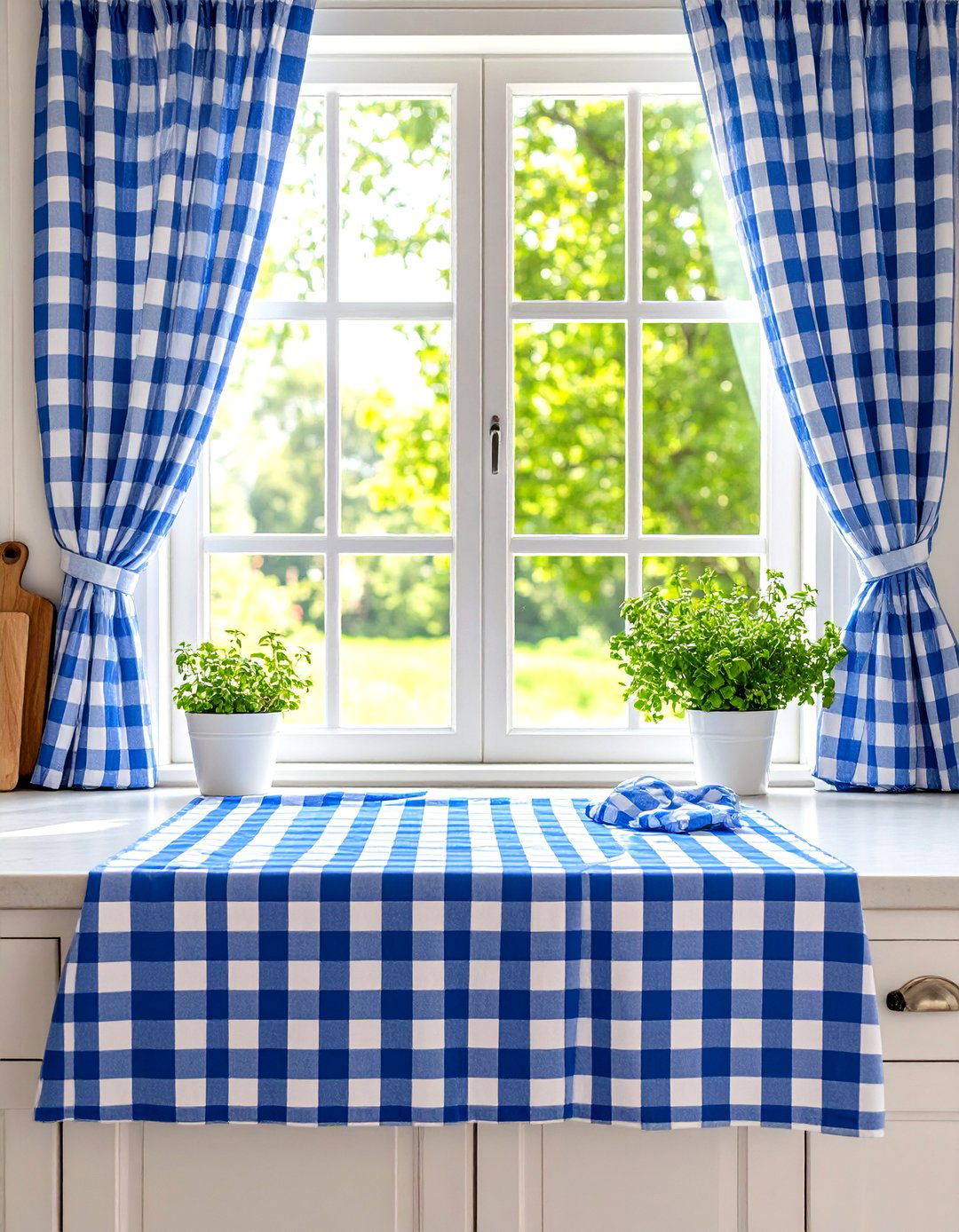
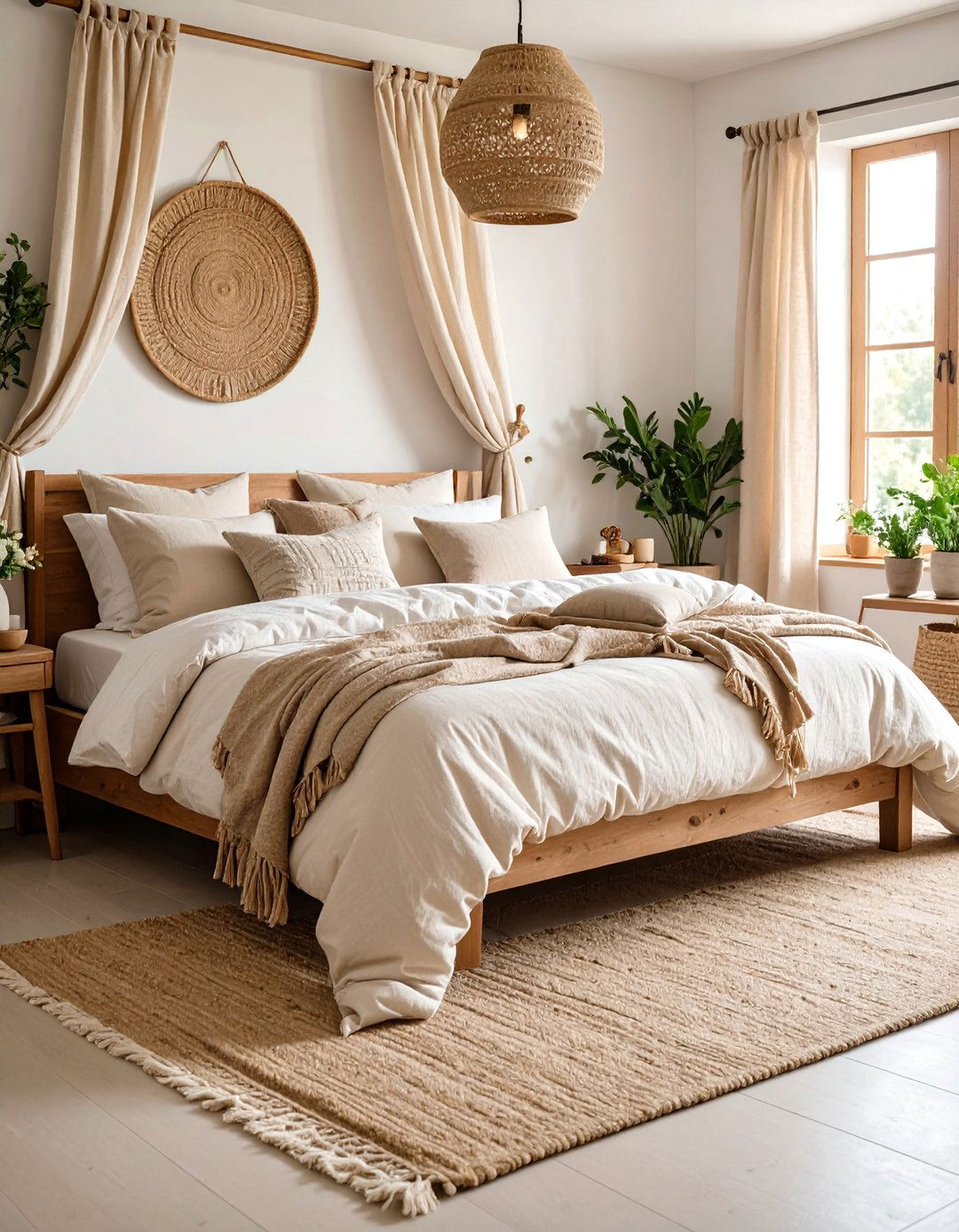
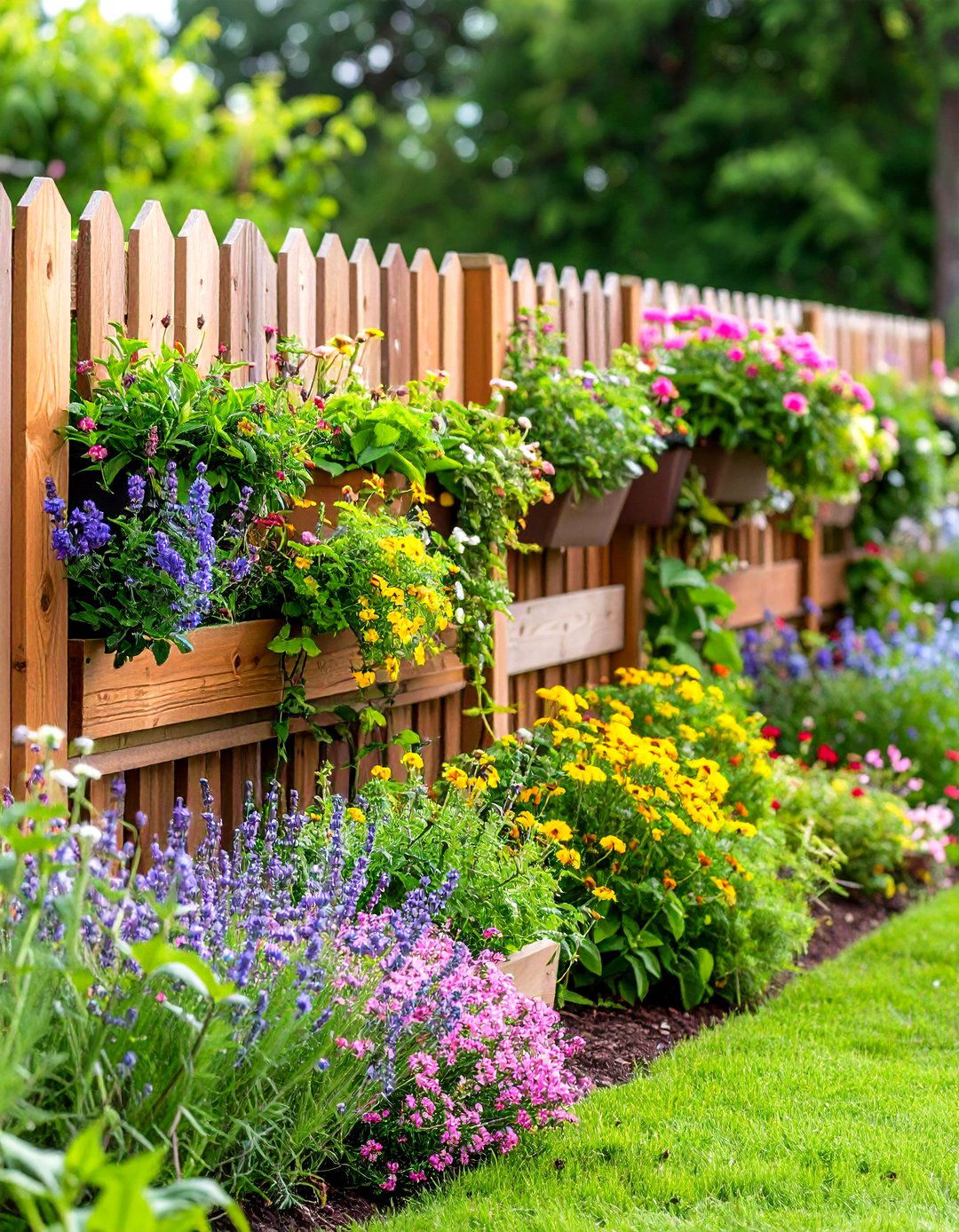
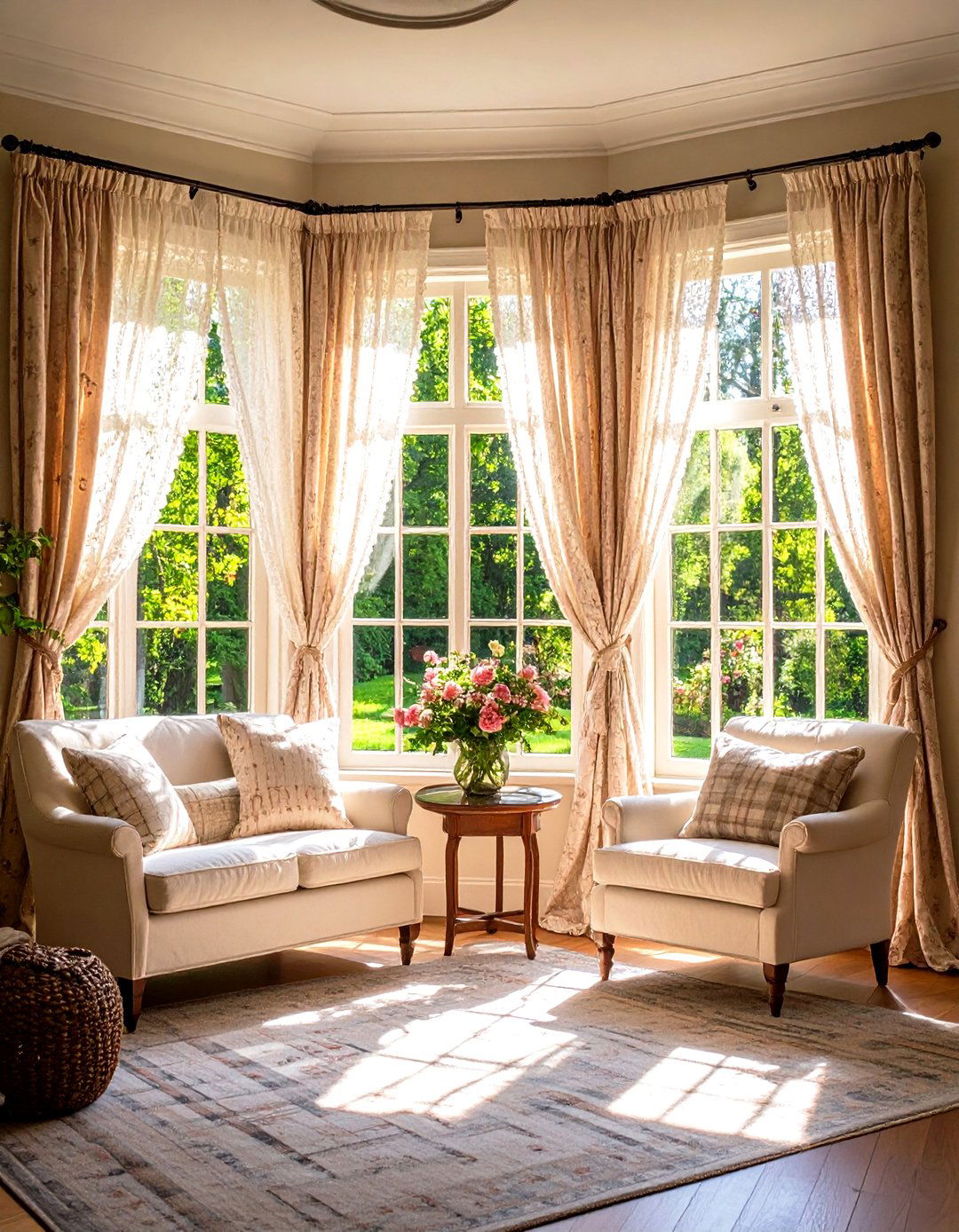
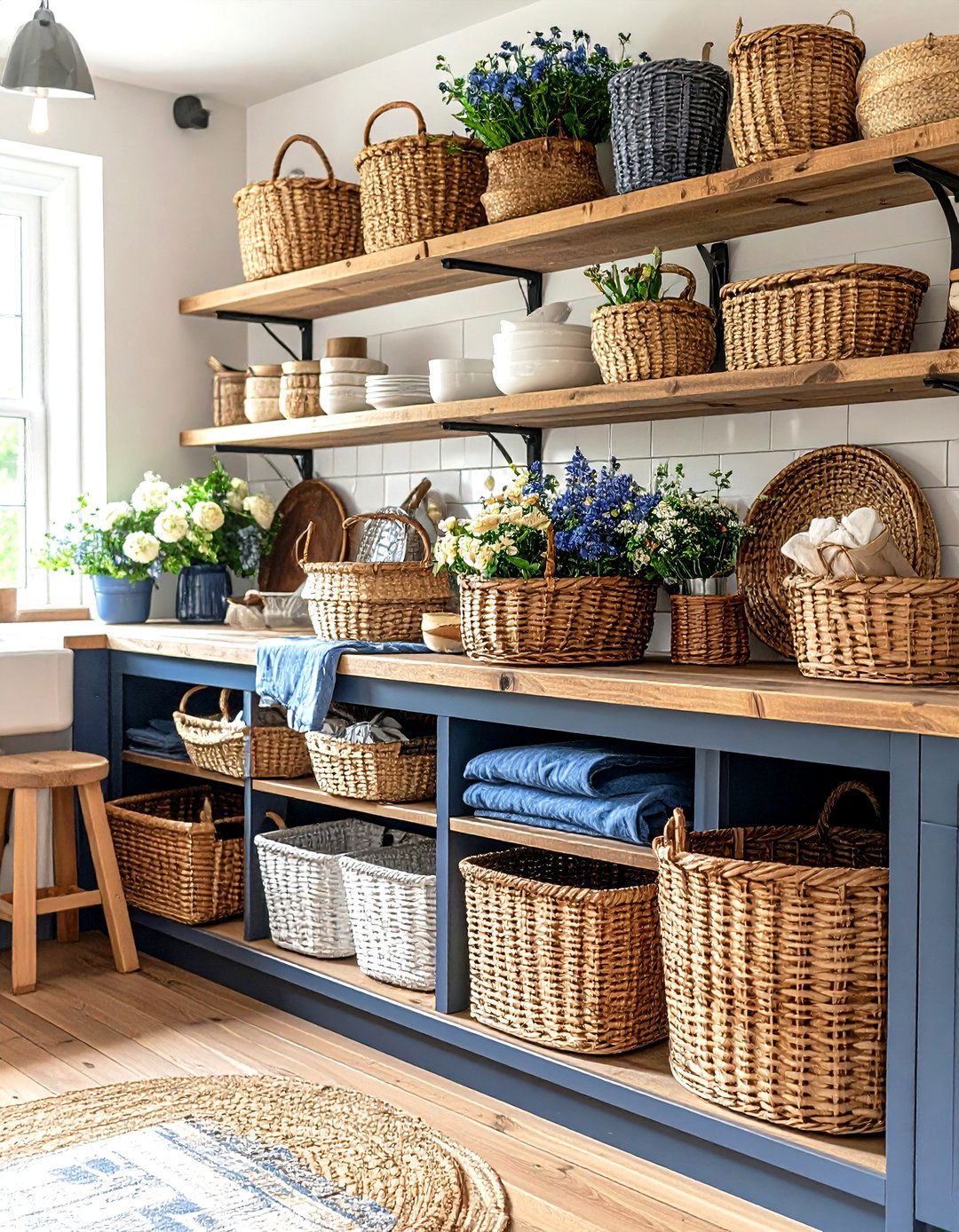
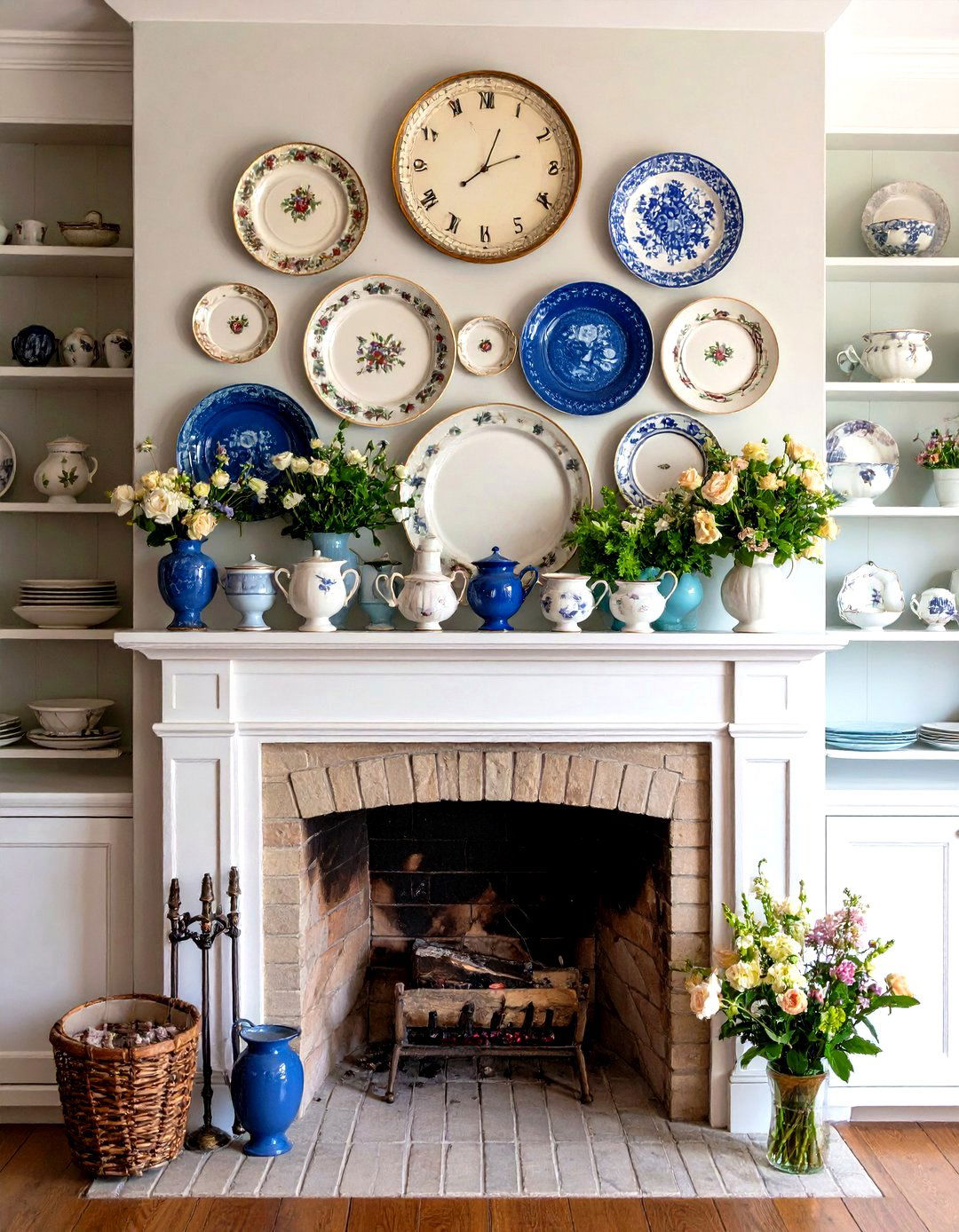
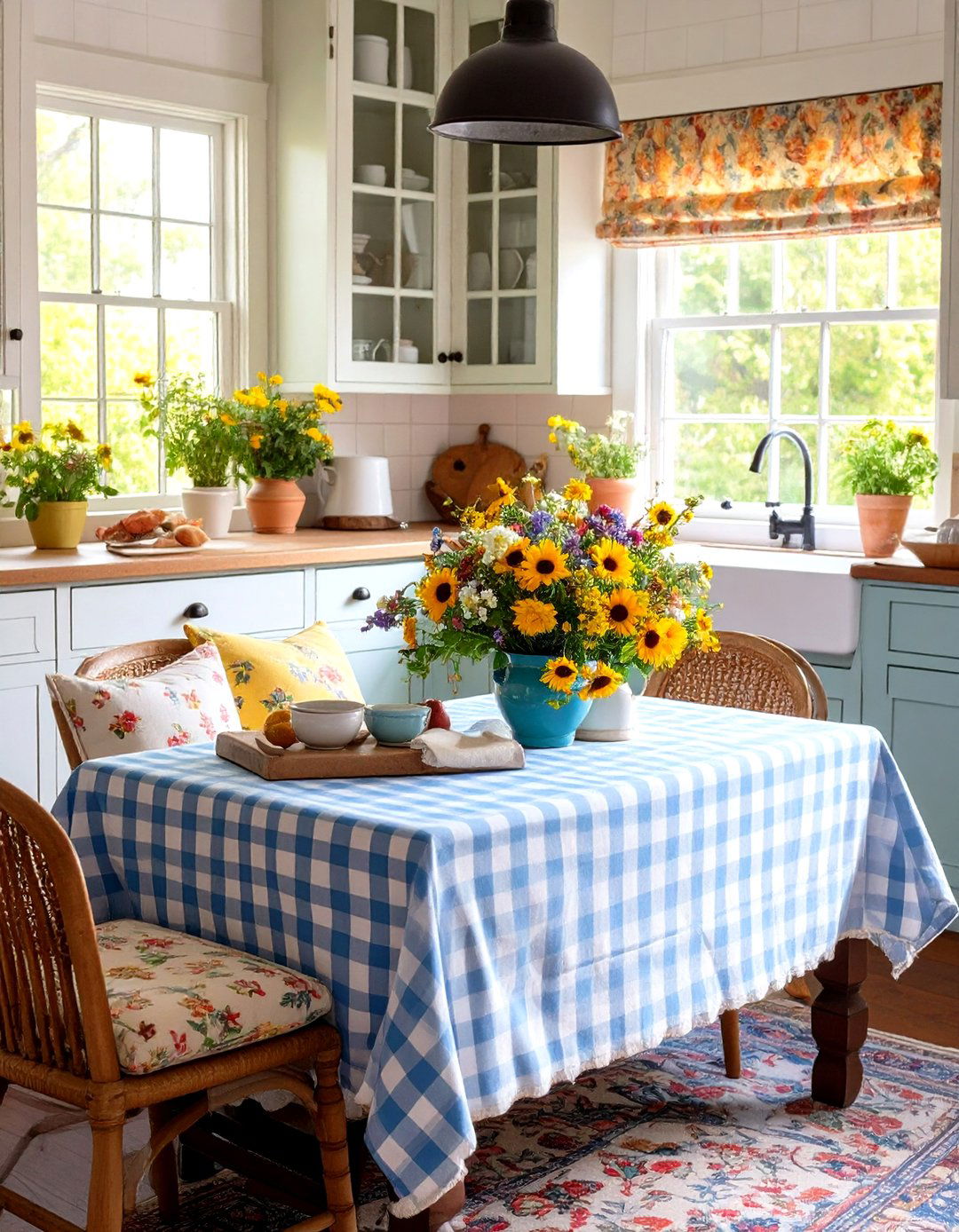
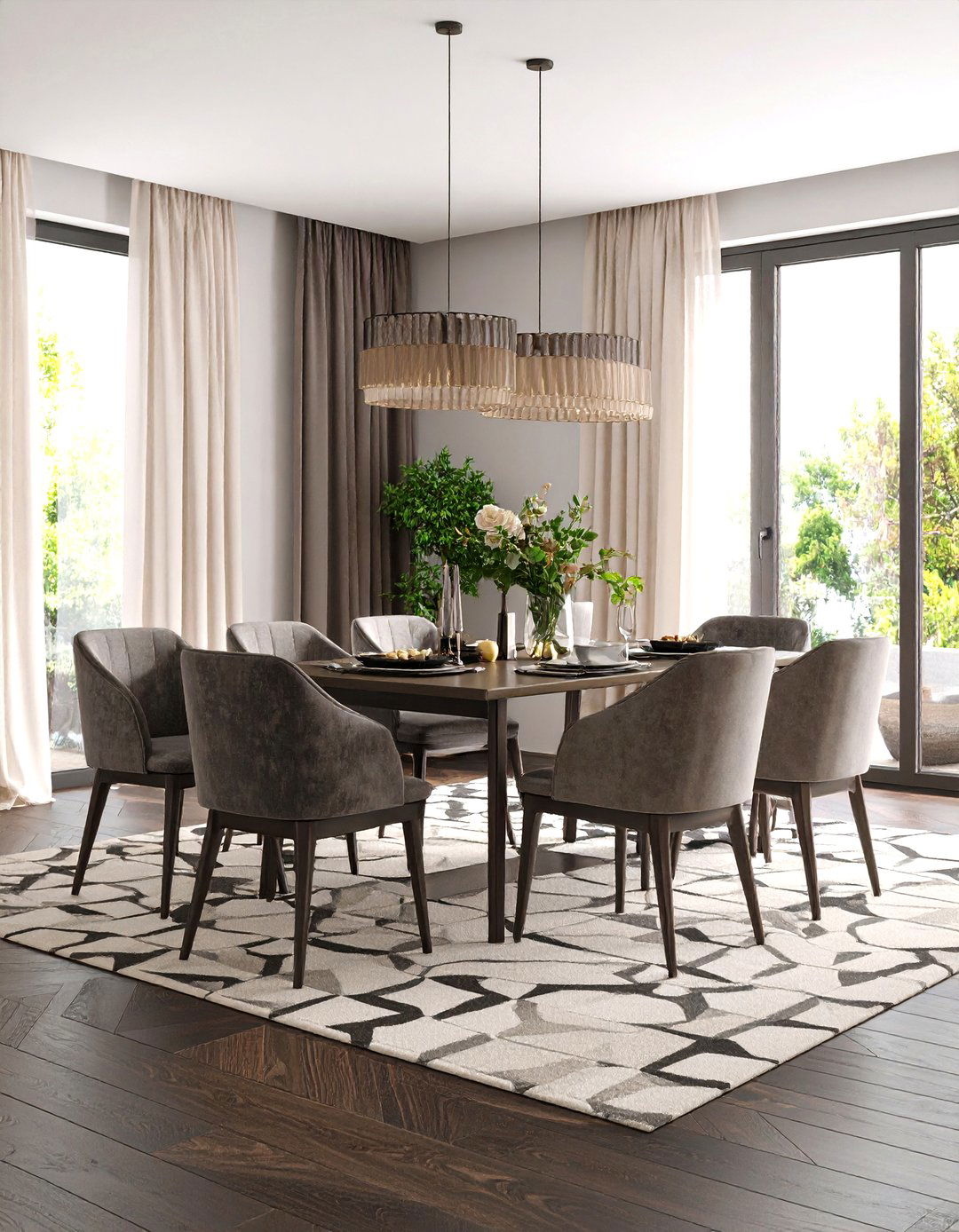
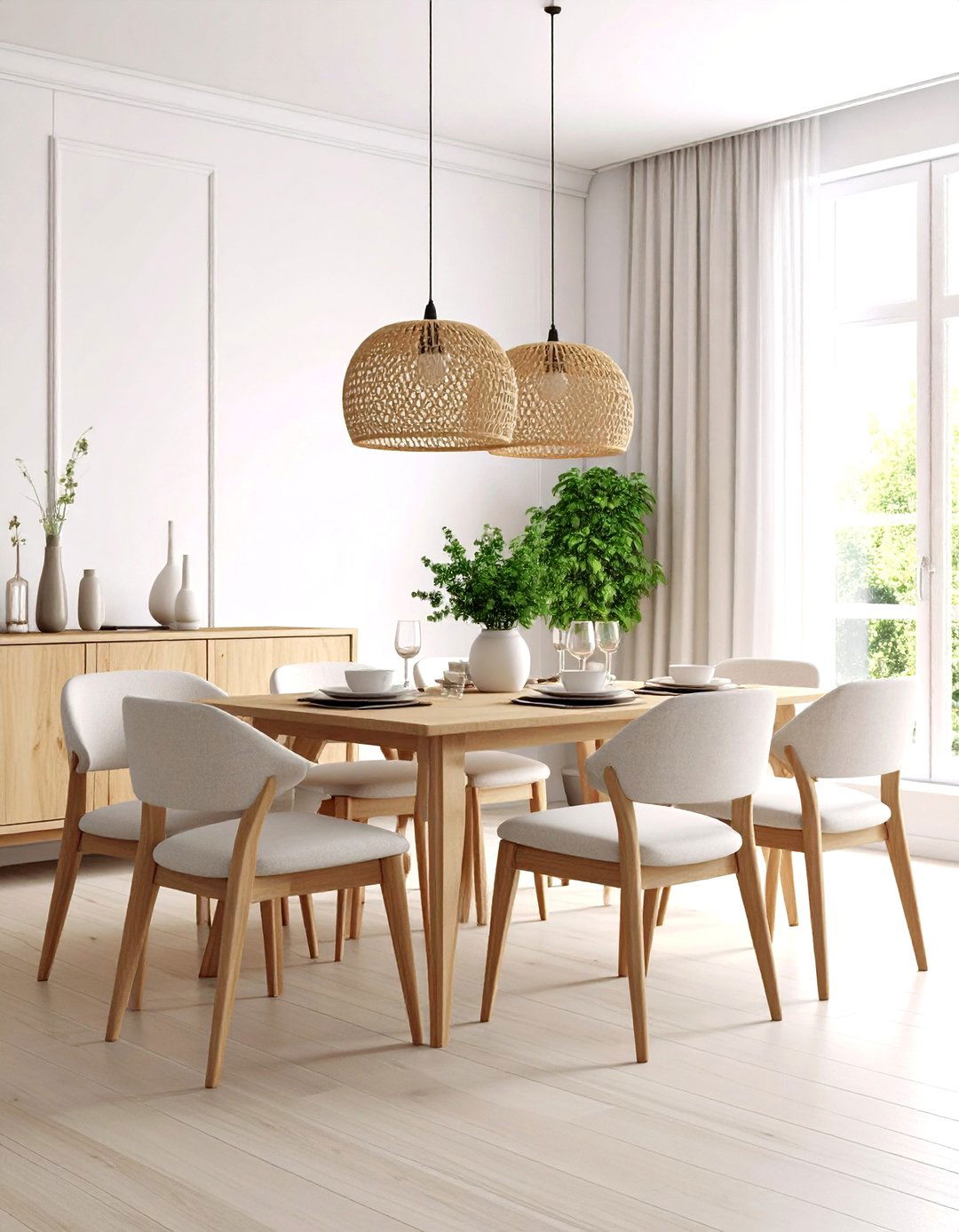
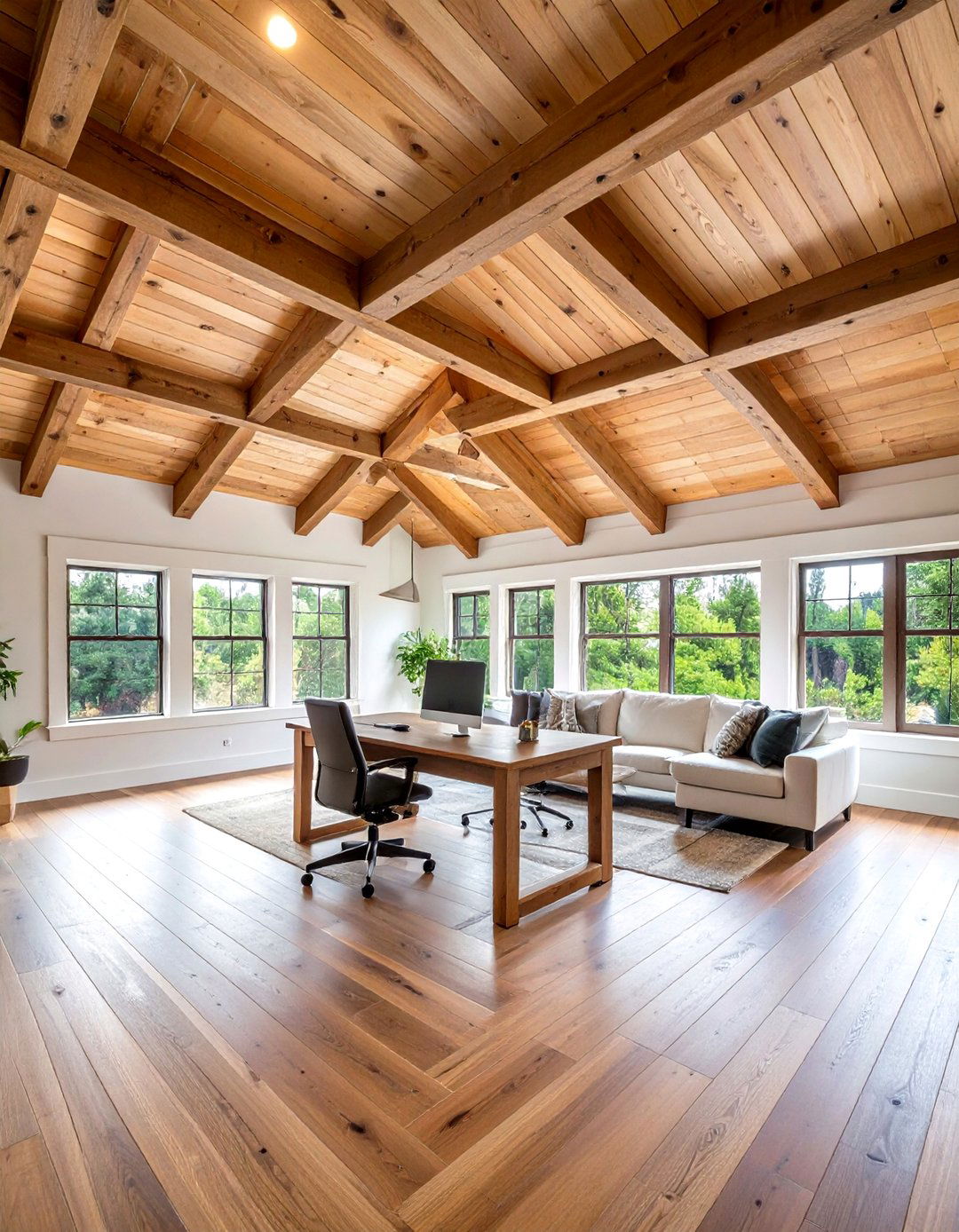
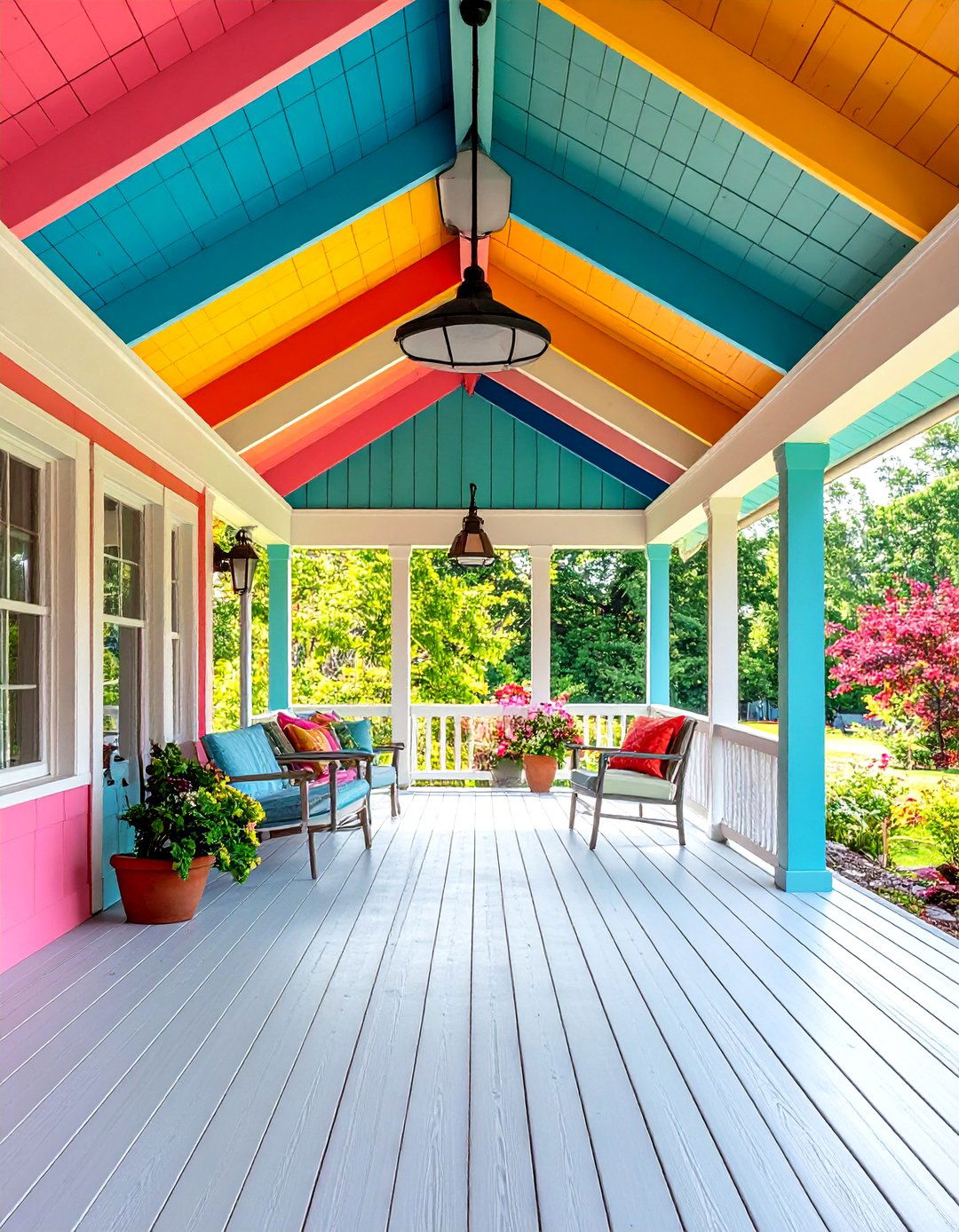
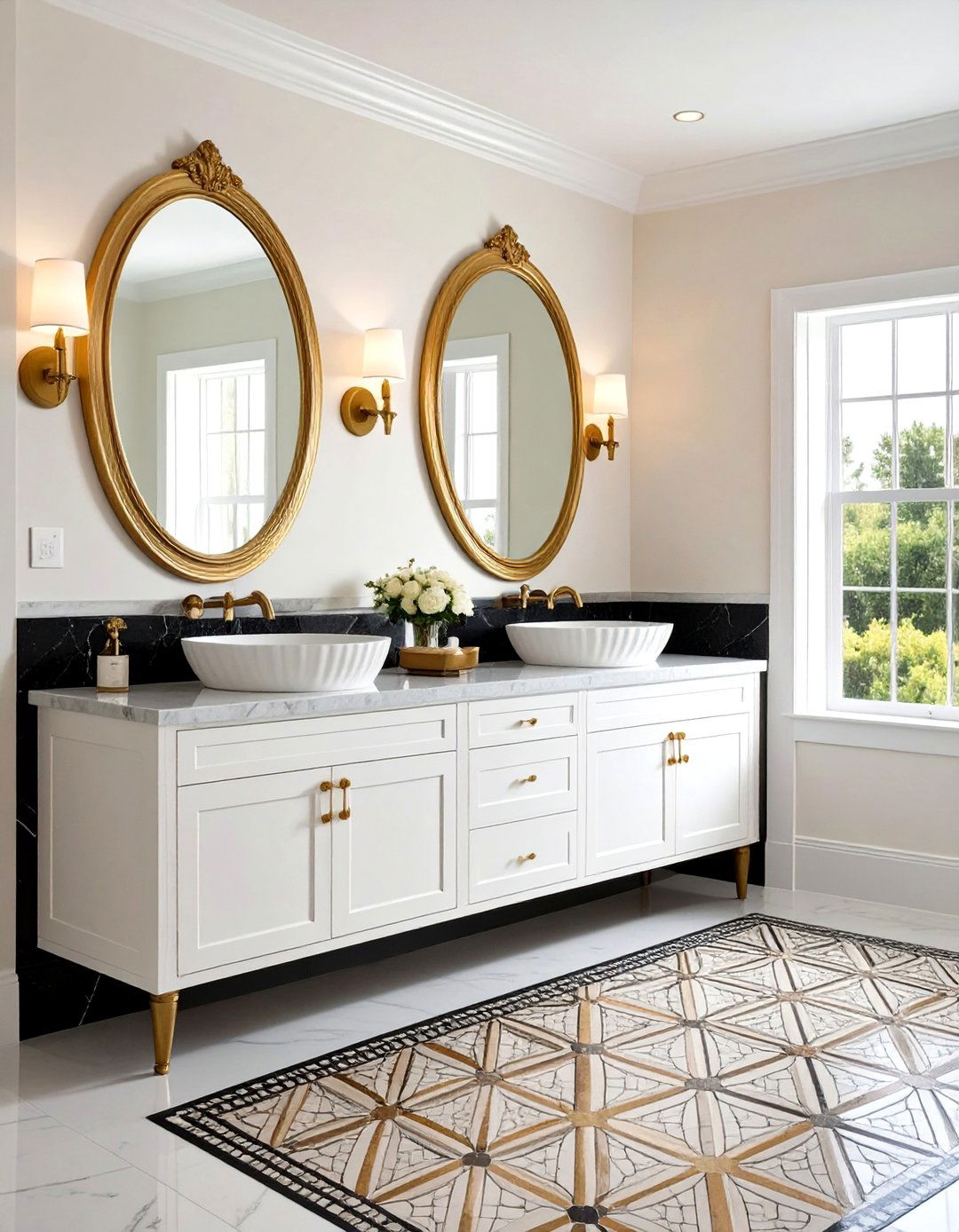
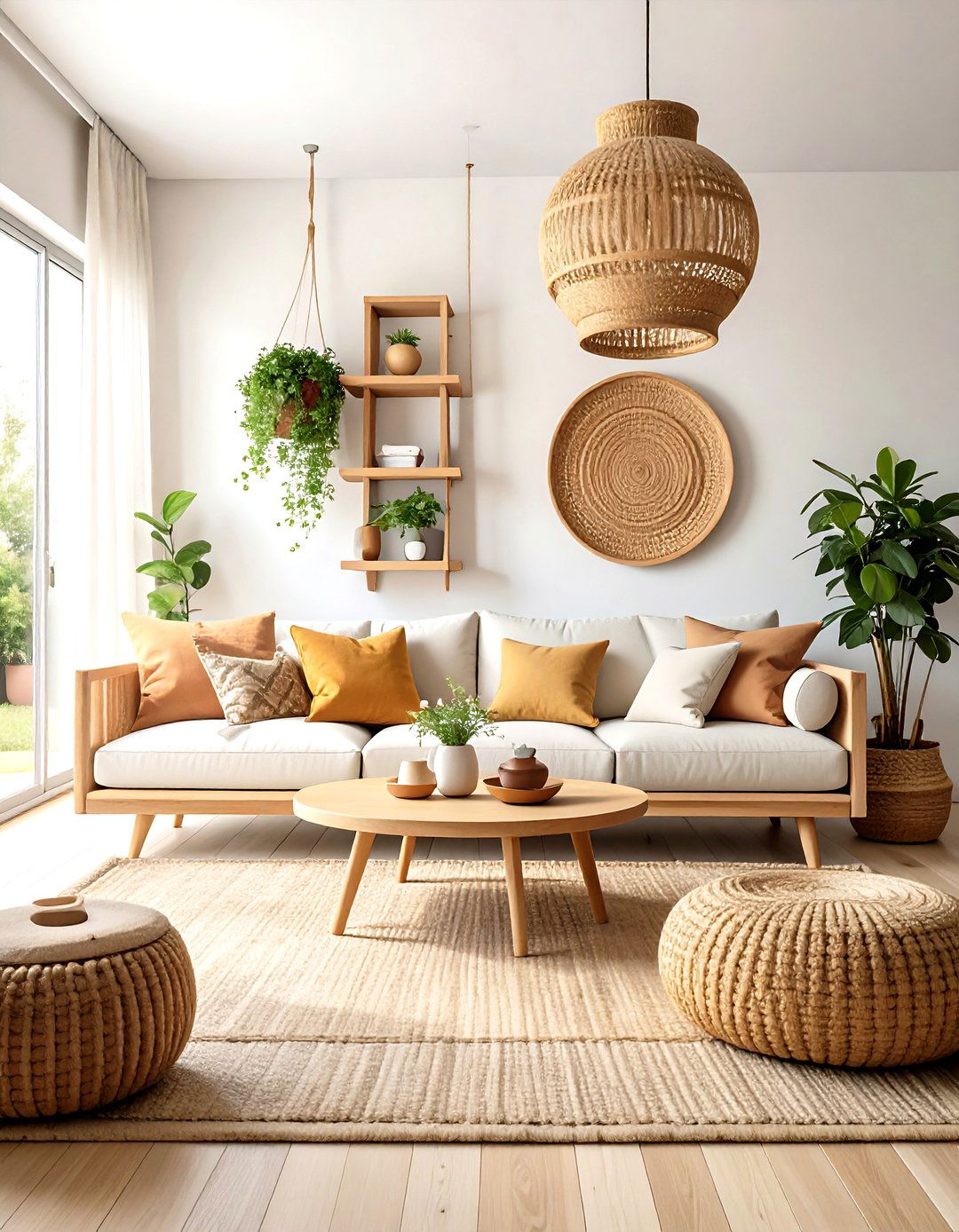
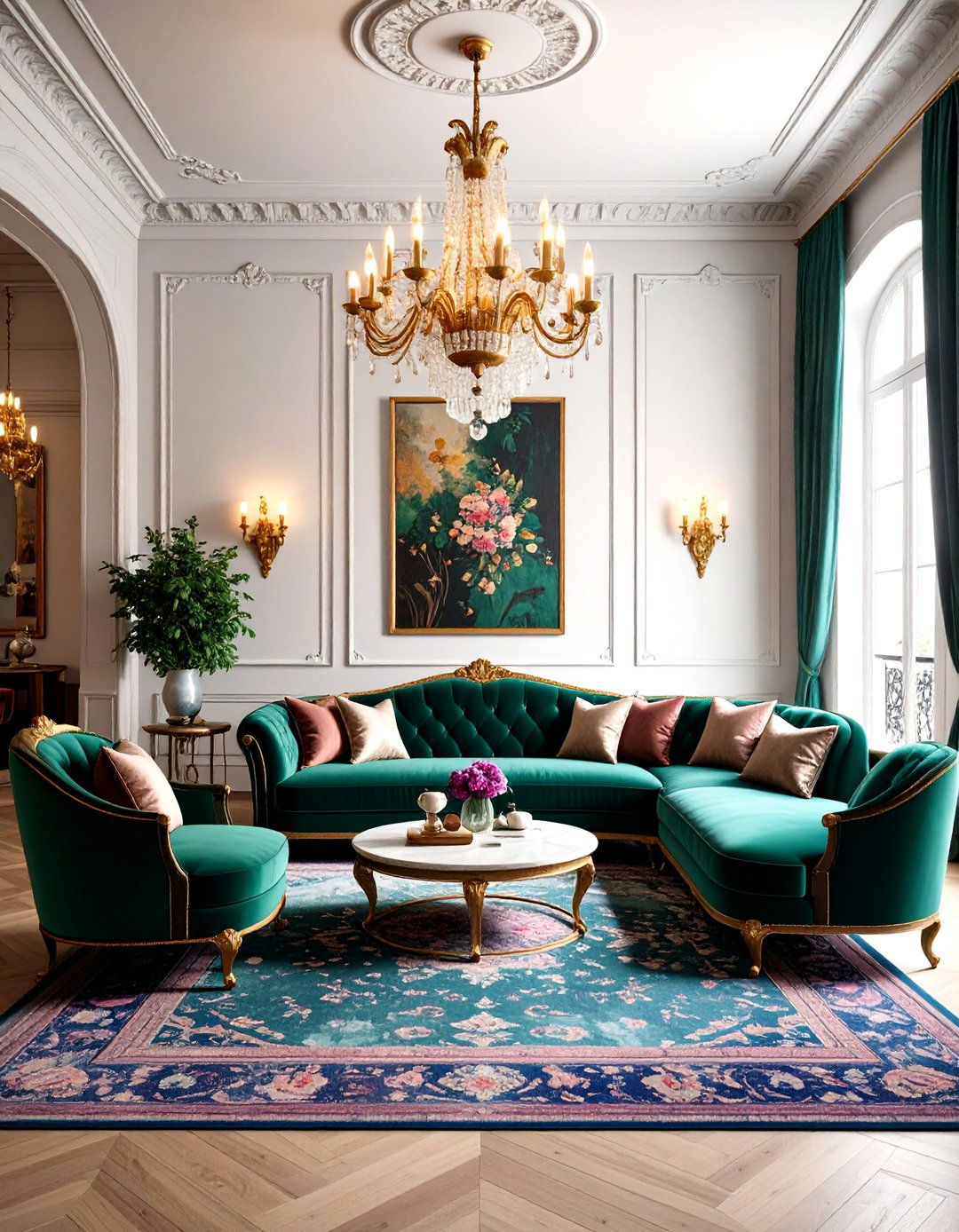
Leave a Reply